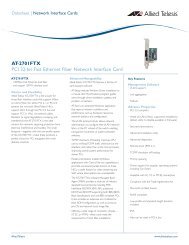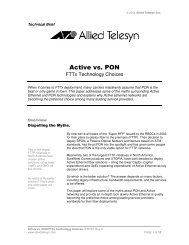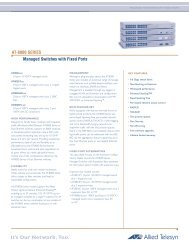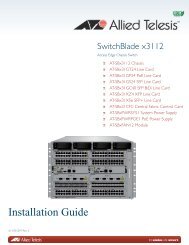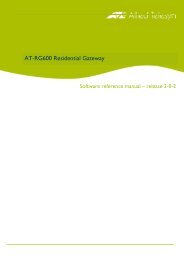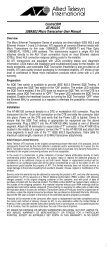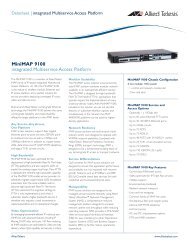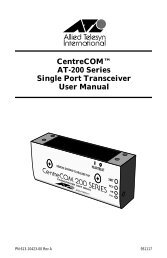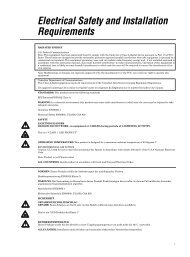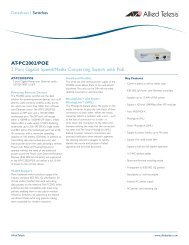AR400 Series Router Installation and Safety Guide - Allied Telesis
AR400 Series Router Installation and Safety Guide - Allied Telesis
AR400 Series Router Installation and Safety Guide - Allied Telesis
Create successful ePaper yourself
Turn your PDF publications into a flip-book with our unique Google optimized e-Paper software.
<strong>AR400</strong> <strong>Series</strong> <strong>Router</strong><br />
<strong>Installation</strong> <strong>and</strong> <strong>Safety</strong> <strong>Guide</strong><br />
AR415S<br />
AR440S<br />
AR441S<br />
AR442S<br />
AR450S
<strong>AR400</strong> <strong>Series</strong> <strong>Router</strong><br />
<strong>Installation</strong> <strong>and</strong> <strong>Safety</strong> <strong>Guide</strong><br />
AR415S<br />
AR440S<br />
AR441S<br />
AR442S<br />
AR450S
2 <strong>AR400</strong> <strong>Series</strong> <strong>Router</strong><br />
<strong>AR400</strong> <strong>Series</strong> <strong>Installation</strong> <strong>and</strong> <strong>Safety</strong> <strong>Guide</strong><br />
Document Number 613-000313 Rev D.<br />
Copyright © 2004-2011 <strong>Allied</strong> <strong>Telesis</strong> Inc. All rights reserved. No part of this<br />
publication may be reproduced without prior written permission from <strong>Allied</strong><br />
<strong>Telesis</strong>, Inc.<br />
<strong>Allied</strong> <strong>Telesis</strong>, Inc. reserves the right to make changes in specifications <strong>and</strong> other<br />
information contained in this document without prior written notice. The<br />
information provided herein is subject to change without notice. In no event<br />
shall <strong>Allied</strong> <strong>Telesis</strong>, Inc. be liable for any incidental, special, indirect, or<br />
consequential damages whatsoever, including but not limited to lost profits,<br />
arising out of or related to this manual or the information contained herein,<br />
even if <strong>Allied</strong> <strong>Telesis</strong> has been advised of, known, or should have known, the<br />
possibility of such damages.<br />
All company names, logos, <strong>and</strong> product designs that are trademarks or<br />
registered trademarks are the property of their respective owners.<br />
613-000313 Rev D
<strong>Installation</strong> <strong>and</strong> <strong>Safety</strong> <strong>Guide</strong> 3<br />
Table of Contents<br />
Models Covered By This <strong>Guide</strong> ........................................................................................... 4<br />
Package Contents .................................................................................................................... 4<br />
AR415S <strong>Router</strong> ........................................................................................................................ 6<br />
Installing the AR415S .......................................................................................................6<br />
Configuring the AR415S .................................................................................................9<br />
Connecting Data Cables to AR415S ......................................................................... 13<br />
System LEDs on AR415S ............................................................................................. 14<br />
AR440S, AR441S, AR442S <strong>Router</strong>s .................................................................................. 15<br />
Installing the AR440S, AR441S, AR442S .................................................................. 15<br />
Configuring the AR440S, AR441S, AR442S ............................................................ 19<br />
Connecting Data Cables to AR440S, AR441S, AR442S ....................................... 25<br />
System LEDs on AR440S, AR441S, AR442S ........................................................... 26<br />
AR450S <strong>Router</strong> ...................................................................................................................... 27<br />
Installing the AR450S .................................................................................................... 27<br />
Configuring the AR450S .............................................................................................. 29<br />
Connecting Data Cables to the AR450S ................................................................. 33<br />
System LEDs on the AR450S ...................................................................................... 34<br />
Default Configuration on AR440S, AR441S, AR442S ................................................... 35<br />
Documentation <strong>and</strong> Tools CD-ROM ................................................................................ 36<br />
Connection to mains voltage supply ................................................................................. 37<br />
Telecommunications Interfaces .......................................................................................... 37<br />
<strong>Safety</strong> ........................................................................................................................................ 39<br />
Sicherheit ................................................................................................................................. 40<br />
Sikkerhed ................................................................................................................................. 41<br />
Veiligheid .................................................................................................................................. 42<br />
Sécurité .................................................................................................................................... 43<br />
Turvallisuus .............................................................................................................................. 44<br />
Norme di Sicurezza ............................................................................................................... 45<br />
Sikkerhet .................................................................................................................................. 46<br />
Segurança ................................................................................................................................. 47<br />
Seguridad ................................................................................................................................. 48<br />
Säkerhet ................................................................................................................................... 49<br />
US Federal Communications Commission (FCC) ......................................................... 50<br />
Canadian Department of Communications ..................................................................... 51<br />
Emission Compliance Statements ...................................................................................... 52<br />
613-000313 Rev D
4 <strong>AR400</strong> <strong>Series</strong> <strong>Router</strong><br />
Models Covered By This <strong>Guide</strong><br />
This <strong>Installation</strong> <strong>and</strong> <strong>Safety</strong> <strong>Guide</strong> includes information on these models:<br />
■<br />
■<br />
■<br />
■<br />
■<br />
AR415S<br />
AR440S<br />
AR441S<br />
AR442S<br />
AR450S<br />
You can download updates to this document from<br />
www.alliedtelesis.com/support/documentation/<br />
Package Contents<br />
Before beginning any installation, please check the package contents. Contact your<br />
authorised <strong>Allied</strong> <strong>Telesis</strong> distributor or reseller if any items are damaged or missing.<br />
AR415S<br />
■ one <strong>AR400</strong> <strong>Series</strong> router<br />
■<br />
■<br />
■<br />
■<br />
■<br />
■<br />
■<br />
■<br />
one AC power cord<br />
one power cord retaining clip<br />
one serial cable for connecting the router to a terminal or PC<br />
two UTP network cables<br />
one 19 inch rack-mount kit<br />
one <strong>AR400</strong> <strong>Series</strong> <strong>Router</strong> <strong>Installation</strong> <strong>and</strong> <strong>Safety</strong> <strong>Guide</strong><br />
one <strong>AR400</strong> <strong>Series</strong> <strong>Router</strong> Documentation <strong>and</strong> Tools CD-ROM (includes the<br />
complete <strong>AR400</strong> <strong>Series</strong> Document Set <strong>and</strong> utilities)<br />
one warranty card<br />
613-000313 Rev D
<strong>Installation</strong> <strong>and</strong> <strong>Safety</strong> <strong>Guide</strong> 5<br />
AR440S, AR441S <strong>and</strong> AR442S<br />
■ one <strong>AR400</strong> <strong>Series</strong> router<br />
■<br />
■<br />
■<br />
■<br />
■<br />
■<br />
■<br />
■<br />
■<br />
one AC power cord<br />
one power cord retaining clip<br />
one serial null modem cable for connecting the router to a terminal or PC<br />
two UTP network cables<br />
one DSL cable<br />
AR440S: two in Australia <strong>and</strong> New Zeal<strong>and</strong><br />
one 19 inch rack-mount kit<br />
one <strong>AR400</strong> <strong>Series</strong> <strong>Router</strong> <strong>Installation</strong> <strong>and</strong> <strong>Safety</strong> <strong>Guide</strong><br />
one <strong>AR400</strong> <strong>Series</strong> <strong>Router</strong> Documentation <strong>and</strong> Tools CD-ROM (includes the complete<br />
<strong>AR400</strong> <strong>Series</strong> Document Set <strong>and</strong> utilities)<br />
one warranty card<br />
AR450S<br />
■ one <strong>AR400</strong> <strong>Series</strong> router<br />
■ one AC power cord<br />
■ one power cord retaining clip<br />
■ one serial null modem cable for connecting the router to a terminal or PC<br />
■ two UTP network cables<br />
■ one 19 inch rack-mount kit<br />
■ one <strong>AR400</strong> <strong>Series</strong> <strong>Router</strong> <strong>Installation</strong> <strong>and</strong> <strong>Safety</strong> <strong>Guide</strong><br />
■<br />
■<br />
one <strong>AR400</strong> <strong>Series</strong> <strong>Router</strong> Documentation <strong>and</strong> Tools CD-ROM (includes the complete<br />
<strong>AR400</strong> <strong>Series</strong> Document Set <strong>and</strong> utilities)<br />
one warranty card<br />
To install your router, see:<br />
■ “AR415S <strong>Router</strong>” on page 6<br />
■ “AR440S, AR441S, AR442S <strong>Router</strong>s” on page 15.<br />
■ “AR450S <strong>Router</strong>” on page 27<br />
613-000313 Rev D
6 <strong>AR400</strong> <strong>Series</strong> <strong>Router</strong><br />
AR415S <strong>Router</strong><br />
This section describes how to install the AR415S router.<br />
■<br />
“Installing the AR415S” below<br />
■ “Configuring the AR415S” on page 9<br />
■ “Connecting Data Cables to AR415S” on page 13<br />
■ “System LEDs on AR415S” on page 14<br />
For corresponding information about installing an AR440S, AR441S or AR442S, see<br />
“AR440S, AR441S, AR442S <strong>Router</strong>s” on page 15.<br />
For corresponding information about installing an AR450S, see “AR450S <strong>Router</strong>” on<br />
page 27.<br />
Installing the AR415S<br />
Selecting a Site<br />
You can install the router:<br />
■<br />
■<br />
on a level surface such as a desktop or bench<br />
in a st<strong>and</strong>ard 19-inch rack, using the rack-mount kit supplied with the router<br />
When you install the router, choose a site that:<br />
■<br />
■<br />
allows adequate airflow around the router <strong>and</strong> its vents<br />
is free of dust <strong>and</strong> moisture<br />
■ will maintain an ambient temperature in the range 0 ºC to 40 ºC<br />
(32 ºF to 104 ºF)<br />
■ will maintain a humidity in the range 5% to 80% non-condensing<br />
■ has a reliable <strong>and</strong> earthed (grounded) power supply, preferably dedicated <strong>and</strong><br />
filtered<br />
■ does not expose cabling to sources of electrical noise such as radio transmitters,<br />
broadb<strong>and</strong> amplifiers, power lines, electric motors, <strong>and</strong> fluorescent fixtures<br />
■ allows easy access to the router’s power <strong>and</strong> cable connections<br />
Before Installing the <strong>Router</strong><br />
■ Read the safety information “<strong>Safety</strong>” on page 39.<br />
■<br />
Unpack the router. Verify the package contents. If any items are damaged or<br />
missing, contact your sales representative.<br />
613-000313 Rev D
<strong>Installation</strong> <strong>and</strong> <strong>Safety</strong> <strong>Guide</strong> 7<br />
Installing an Optional PIC<br />
If you purchased an optional PIC, install it now by following the Port Interface Card<br />
Quick Install <strong>Guide</strong>. The PIC Quick Install <strong>Guide</strong> can be found with the PIC, on the<br />
Documentation <strong>and</strong> Tools CD-ROM, or can be downloaded from<br />
www.alliedtelesis.com/support/documentation/<br />
Installing the <strong>Router</strong> in a Rack<br />
1. Gather additional items. You will need:<br />
• the rack-mount kit (in your router package, or ordered from your authorised<br />
<strong>Allied</strong> <strong>Telesis</strong> distributor or reseller)<br />
• a Phillips #1 screwdriver<br />
• screws <strong>and</strong> cage nuts to attach the brackets to your rack<br />
2. Check the rack.<br />
Ensure that the rack is safely secured <strong>and</strong> that it will not tip over. Devices in a<br />
rack should be installed starting at the bottom, with the heavier devices near the<br />
bottom of the rack.<br />
Ensure the rack has sufficient space for the router <strong>and</strong> its associated cables. The<br />
router is 1U high.<br />
3. Unscrew the feet from the router.<br />
4. Connect the h<strong>and</strong>les to the brackets.<br />
Screw the h<strong>and</strong>les to the wider side of each bracket, using the supplied screws<br />
(see figure below).<br />
5. Connect the brackets to the router.<br />
Screw the brackets to the sides of the router, using the supplied screws (see<br />
figure below). The router can be front or rear mounted.<br />
Rmount<br />
613-000313 Rev D
8 <strong>AR400</strong> <strong>Series</strong> <strong>Router</strong><br />
6. Mount the router in the rack.<br />
Use appropriate rack mounting screws (not supplied).<br />
Applying Power to the <strong>Router</strong><br />
1. Check the supply voltage <strong>and</strong> the router’s rated voltage.<br />
<strong>AR400</strong> <strong>Series</strong> routers are fitted with a universal mains power supply that will<br />
function over the range 100 VAC to 240 VAC <strong>and</strong> 50 Hz to 60 Hz.<br />
For continued protection against the risk of fire <strong>and</strong> shock hazard, replace fuses<br />
only with the same type <strong>and</strong> rating.<br />
Warning The specific power supply requirements for a particular model are<br />
clearly displayed on the rear or underside of the router. If the supply is outside<br />
the accepted range for the router, the router may not operate or damage to<br />
the router may result.<br />
2. Fit the power cord retaining clip to the AC power inlet on the router’s rear panel.<br />
3. Connect the provided power cord to the AC power inlet <strong>and</strong> clip it in place.<br />
Switch the router’s power switch to the ON position. The Power LED lights<br />
continuously <strong>and</strong> the System LED lights briefly. The Port LEDs also light briefly.<br />
The router is supplied with an approved power cord that incorporates a<br />
moulded plug. It must only be used with the power cord supplied.<br />
If the LEDs fail to light, the most likely cause is that the router is not receiving<br />
power. Check that:<br />
■ the power supply outlet’s switch (if any), <strong>and</strong> the router’s power switch, are in<br />
the ON position<br />
■ the power cable is securely plugged in<br />
■ the power supply is operational<br />
613-000313 Rev D
<strong>Installation</strong> <strong>and</strong> <strong>Safety</strong> <strong>Guide</strong> 9<br />
Configuring the AR415S<br />
You can configure the router via the comm<strong>and</strong> line interface (CLI) or the graphical<br />
user interface (GUI). First use the CLI to assign an IP address to the router, then use<br />
the CLI or the GUI to complete the configuration.<br />
■ “Using the CLI to configure the AR415S” below<br />
■ “Using the GUI to configure the AR415S” on page 11<br />
Using the CLI to configure the AR415S<br />
This section describes how to access the router’s comm<strong>and</strong> line interface (CLI)<br />
using a terminal or PC connected to the router’s console port.<br />
1. Initiate router start-up.<br />
Using the terminal cable supplied, connect a VT100-compatible terminal, or the<br />
COM port of a PC running a terminal emulation program such as Windows<br />
Hyper Terminal, to the Console RS-232 (ASYN0) port on the router’s rear<br />
panel.<br />
Set the communication parameters on your terminal or terminal emulation<br />
program to:<br />
• Baud rate: 9600<br />
• Data bits: 8<br />
• Parity: None<br />
• Stop bits: 1<br />
• Flow control: Hardware<br />
See the <strong>AR400</strong> <strong>Series</strong> <strong>Router</strong> Hardware Reference for more information on<br />
configuring emulation software.<br />
613-000313 Rev D
10 <strong>AR400</strong> <strong>Series</strong> <strong>Router</strong><br />
2. Log in <strong>and</strong> set the password.<br />
The login prompt appears on the terminal or PC. If the login prompt does not<br />
appear, press [Enter] two or three times.<br />
When the router boots for the first time it automatically creates an account<br />
with manager privileges. The account has the user name “manager” <strong>and</strong> the<br />
password is “friend”. Passwords are case sensitive.<br />
At the login prompt, enter the user name <strong>and</strong> password.<br />
Login: manager<br />
Password: friend<br />
The router’s comm<strong>and</strong> prompt appears <strong>and</strong> you can now configure the router<br />
using the comm<strong>and</strong> line interface.<br />
Warning Change the password as soon as possible. Leaving the manager<br />
account with the default password is a serious security risk. Make sure you<br />
remember the new password as there is no way to retrieve it if it is lost.<br />
Use the following comm<strong>and</strong> to change the account password:<br />
set password<br />
3. Configure the router.<br />
See the <strong>AR400</strong> <strong>Series</strong> <strong>Router</strong> Software Reference for more information on router<br />
start-up <strong>and</strong> configuration procedures (including a list of message definitions). To<br />
continue configuring the router using the CLI, use the comm<strong>and</strong>s in the<br />
Software Reference.<br />
To display a list of help topics, enter:<br />
help<br />
To display help on a specific topic, enter:<br />
help topic<br />
Alternatively, type a question mark (?) at the end of a partially completed<br />
comm<strong>and</strong> to see a list of valid options.<br />
4. Save the configuration.<br />
Save your configuration to a new file by using the comm<strong>and</strong>:<br />
create config=filename.cfg<br />
Then set the router to load this file when it restarts by using the comm<strong>and</strong>:<br />
set config=filename.cfg<br />
We recommend leaving the boot.cfg file unchanged, in case you need to revert<br />
to the original default configuration.<br />
To continue configuring the router using the GUI, see the following section.<br />
613-000313 Rev D
ON<br />
OFF<br />
ON<br />
OFF<br />
POWER<br />
POWER<br />
100-240 VAC<br />
50/60 Hz<br />
2.1 A<br />
10BASE-T/100BASE-TX SWITCH PORTS<br />
4 3<br />
2 1<br />
ON<br />
OFF<br />
POWER<br />
4 2<br />
3 1<br />
POWER<br />
100-240 VAC<br />
50/60 Hz<br />
2.1 A<br />
ASYN0<br />
ETH0<br />
PIC BAY<br />
SWITCH PORTS<br />
4 2<br />
3 1<br />
ASYN0<br />
PIC BAY<br />
<strong>Installation</strong> <strong>and</strong> <strong>Safety</strong> <strong>Guide</strong> 11<br />
Using the GUI to configure the AR415S<br />
This section describes how to access the GUI via a switch port in VLAN1 on the<br />
AR415S router, when the PC <strong>and</strong> the router are in the same subnet, in order to<br />
configure the router. The router’s switch ports all belong to VLAN1 by default.<br />
The GUI requires a PC <strong>and</strong> web browser. Supported browsers are Internet Explorer<br />
5.0 or later <strong>and</strong> Netscape 6.2.2 or later, with JavaScript enabled. If you are using a<br />
toolbar or plug-in on your browser to block pop-ups, disable it while using the GUI.<br />
The GUI displays detailed configuration options <strong>and</strong> information in pop-up windows.<br />
1. Connect the PC to a router switch port.<br />
The PC can be connected either directly or through your LAN.<br />
To connect the PC directly to the router, use a straight-through Ethernet cable<br />
to connect an Ethernet card on the PC to any one of the router’s switch ports.<br />
Note the PC’s IP address <strong>and</strong> mask.<br />
router<br />
straight-through cable<br />
SWITCH PORTS<br />
POWER<br />
ETH0<br />
switch ports<br />
PC<br />
To connect via a LAN, use an Ethernet cable to connect the router’s switch<br />
port(s) to the device(s) on the LAN. Select the LAN PC from which you wish to<br />
configure the router. The PC should be in the same subnet as the part of the<br />
LAN that contains the router (for example, the PC could be connected to a hub<br />
or Layer 2 switch that is directly connected to one of the router’s switch ports).<br />
Note the PC’s IP address <strong>and</strong> mask.<br />
PC<br />
hub or layer 2<br />
switch<br />
router<br />
switch ports<br />
2. Access the CLI on the router.<br />
Follow the instructions in the previous section “Using the CLI to configure the<br />
AR415S” on page 9.<br />
613-000313 Rev D
12 <strong>AR400</strong> <strong>Series</strong> <strong>Router</strong><br />
3. Enable IP.<br />
In the CLI, enter the comm<strong>and</strong>:<br />
enable ip<br />
4. Assign an IP address to VLAN1.<br />
Assign the VLAN1 interface an IP address in the subnet that the PC uses, using<br />
the comm<strong>and</strong>:<br />
add ip interface=vlan1 ip=ipaddress mask=mask<br />
5. Browse to the GUI.<br />
If you access the Internet through a proxy server, set your browser to bypass<br />
the proxy for the IP address you assigned to the VLAN1 interface.<br />
Point your web browser at the IP address of the VLAN interface.<br />
6. Log in <strong>and</strong> set the password.<br />
At the log in prompt, enter the log in name <strong>and</strong> password. Passwords are case<br />
sensitive.<br />
User Name: manager<br />
Password: friend<br />
The system status page appears <strong>and</strong> you can now use the GUI to configure the<br />
router.<br />
Important To ensure configuration settings are saved correctly, use the GUI<br />
menus <strong>and</strong> buttons to navigate, not your browser’s buttons.<br />
Caution As a security precaution, change the password as soon as<br />
possible.<br />
To change the password, select Management > Users from the sidebar menu.<br />
Select the Manager account <strong>and</strong> click Modify.<br />
7. Configure the router.<br />
Use the GUI to continue configuring your router. To access context-sensitive<br />
help in the GUI, click on the Help button [Help]. The Help button is located at<br />
the top of the sidebar menu or on any popup page.<br />
613-000313 Rev D
<strong>Installation</strong> <strong>and</strong> <strong>Safety</strong> <strong>Guide</strong> 13<br />
Connecting Data Cables to AR415S<br />
Connecting the router to your network:<br />
1. Connect to the LAN<br />
If you have not already done so, use straight-through Ethernet patch cables to<br />
connect the device(s) on your private network (LAN) to the router’s switch<br />
port(s). By default, all switch ports are members of VLAN1.<br />
2. Connect to the WAN.<br />
Caution If you intend to use a firewall, configure it before you activate<br />
the WAN link.<br />
Once initial configuration is complete, connect the router to the WAN:<br />
• Connect a PIC port to a WAN connection. See the Port Interface Card Quick<br />
Install <strong>Guide</strong> <strong>and</strong> Hardware Reference.<br />
• Use an Ethernet patch cable to connect the router’s Ethernet WAN (ETH0)<br />
port to the Ethernet port of a WAN device (such as a modem).<br />
613-000313 Rev D
14 <strong>AR400</strong> <strong>Series</strong> <strong>Router</strong><br />
System LEDs on AR415S<br />
The LEDs described in the following table show the operational status <strong>and</strong> port<br />
activity for the AR415S router.<br />
LED State Function<br />
PWR Green The router is receiving power <strong>and</strong> the power<br />
switch is ON.<br />
SYS Amber Lit briefly during router start up, or the router is<br />
malfunctioning.<br />
Off<br />
Normal operation.<br />
PIC 0 Green A port interface card (PIC) is correctly installed<br />
<strong>and</strong> has been detected by the router.<br />
Off<br />
No PIC is installed, or the router has not<br />
recognised the PIC.<br />
Full Green The link is in full-duplex mode.<br />
Off<br />
The link is in half-duplex mode.<br />
L/A Green A link has been established.<br />
Flashing<br />
Data is being transmitted.<br />
Off<br />
There is no link.<br />
100M Green The link is at 100 Mbps speed.<br />
Off<br />
The link is at 10 Mbps speed.<br />
613-000313 Rev D
<strong>Installation</strong> <strong>and</strong> <strong>Safety</strong> <strong>Guide</strong> 15<br />
AR440S, AR441S, AR442S <strong>Router</strong>s<br />
This section describes how to install the AR440S, AR441S <strong>and</strong> AR442S routers.<br />
■<br />
“Installing the AR440S, AR441S, AR442S” below<br />
■ “Configuring the AR440S, AR441S, AR442S” on page 19<br />
■ “Connecting Data Cables to AR440S, AR441S, AR442S” on page 25<br />
■ “System LEDs on AR440S, AR441S, AR442S” on page 26<br />
For corresponding information about installing an AR415S, see “AR415S <strong>Router</strong>” on<br />
page 6.<br />
For corresponding information about installing an AR450S, see “AR450S <strong>Router</strong>” on<br />
page 27.<br />
Installing the AR440S, AR441S, AR442S<br />
Selecting a Site<br />
You can install the router:<br />
■<br />
■<br />
■<br />
on a level surface such as a desktop or bench<br />
in a st<strong>and</strong>ard 19-inch rack, using the rack-mount kit supplied with the router<br />
on a firm wall, using a wall-mount kit ordered from your authorised <strong>Allied</strong><br />
<strong>Telesis</strong> distributor or reseller<br />
When you install the router, choose a site that:<br />
■ allows adequate airflow around the router <strong>and</strong> its vents<br />
■ is free of dust <strong>and</strong> moisture<br />
■ will maintain an ambient temperature in the range 0 ºC to 50 ºC<br />
(32 ºF to 122 ºF)<br />
■ will maintain a humidity in the range 5% to 80% non-condensing<br />
■ has a reliable <strong>and</strong> earthed (grounded) power supply, preferably dedicated <strong>and</strong><br />
filtered<br />
■ does not expose cabling to sources of electrical noise such as radio transmitters,<br />
broadb<strong>and</strong> amplifiers, power lines, electric motors, <strong>and</strong> fluorescent fixtures<br />
■ allows easy access to the router’s power <strong>and</strong> cable connections<br />
Before Installing the <strong>Router</strong><br />
■ Read the safety information “<strong>Safety</strong>” on page 39.<br />
■<br />
Unpack the router. Verify the package contents. If any items are damaged or<br />
missing, contact your sales representative.<br />
613-000313 Rev D
16 <strong>AR400</strong> <strong>Series</strong> <strong>Router</strong><br />
Installing an Optional PIC<br />
If you purchased an optional PIC, install it now by following the Port Interface Card<br />
Quick Install <strong>Guide</strong>. The PIC Quick Install <strong>Guide</strong> can be found with the PIC, on the<br />
Documentation <strong>and</strong> Tools CD-ROM, or can be downloaded from<br />
www.alliedtelesis.com/support/documentation/<br />
Installing the <strong>Router</strong> in a Rack<br />
1. Gather additional items. You will need:<br />
• the rack-mount kit (in your router package, or ordered from your authorised<br />
<strong>Allied</strong> <strong>Telesis</strong> distributor or reseller)<br />
• a Phillips #1 screwdriver<br />
• screws <strong>and</strong> cage nuts to attach the brackets to your rack<br />
2. Check the rack.<br />
Ensure that the rack is safely secured <strong>and</strong> that it will not tip over. Devices in a<br />
rack should be installed starting at the bottom, with the heavier devices near the<br />
bottom of the rack.<br />
Ensure the rack has sufficient space for the router <strong>and</strong> its associated cables. The<br />
router is 1U high.<br />
3. Unscrew the feet from the router.<br />
4. Connect the h<strong>and</strong>les to the brackets.<br />
Screw the h<strong>and</strong>les to the wider side of each bracket, using the supplied screws<br />
(see figure below).<br />
5. Connect the brackets to the router.<br />
Screw the brackets to the sides of the router, using the supplied screws (see<br />
figure below). The router can be front or rear mounted.<br />
613-000313 Rev D
<strong>Installation</strong> <strong>and</strong> <strong>Safety</strong> <strong>Guide</strong> 17<br />
6. Mount the router in the rack.<br />
Use appropriate rack mounting screws (not supplied).<br />
Installing the <strong>Router</strong> on a Wall<br />
You can install the router on a firm wall.<br />
1. Gather additional items. You will need:<br />
• a wall mount bracket kit (ordered from your authorised <strong>Allied</strong> <strong>Telesis</strong><br />
distributor or reseller)<br />
• a Phillips #1 screwdriver<br />
• a Phillips #2 screwdriver<br />
• If you are fixing the router to a solid masonry or hollow wall, you need<br />
equipment to drill a 6 mm hole. The wall mount brackets are supplied with<br />
screws <strong>and</strong> plugs to fasten the brackets to a masonry or plasterboard wall. If<br />
you are fixing it to a wooden wall, the screws are self-tapping.<br />
2. Screw the brackets to the router.<br />
Screw a wall mount bracket to the outer screw holes on each side of the router<br />
using the shorter M3 screws supplied.<br />
Screw the wall brackets to the wall with the brackets at the top <strong>and</strong> bottom <strong>and</strong><br />
the feet against the wall.<br />
613-000313 Rev D
18 <strong>AR400</strong> <strong>Series</strong> <strong>Router</strong><br />
Applying Power to the <strong>Router</strong><br />
1. Check the supply voltage <strong>and</strong> the router’s rated voltage.<br />
<strong>AR400</strong> <strong>Series</strong> routers are fitted with a universal mains power supply that will<br />
function over the range 100 VAC to 240 VAC <strong>and</strong> 50 Hz to 60 Hz.<br />
For continued protection against the risk of fire <strong>and</strong> shock hazard, replace fuses<br />
only with the same type <strong>and</strong> rating.<br />
Warning The specific power supply requirements for a particular model are<br />
clearly displayed on the rear or underside of the router. If the supply is outside<br />
the accepted range for the router, the router may not operate or damage to<br />
the router may result.<br />
2. Fit the power cord retaining clip to the AC power inlet on the router’s rear panel.<br />
3. Connect the provided power cord to the AC power inlet <strong>and</strong> clip it in place.<br />
Switch the router’s power switch to the ON position. The Power LED lights<br />
continuously <strong>and</strong> the System LED lights briefly. The Port LEDs also light briefly.<br />
The router is supplied with an approved power cord that incorporates a<br />
moulded plug. It must only be used with the power cord supplied.<br />
If the LEDs fail to light, the most likely cause is that the router is not receiving<br />
power. Check that:<br />
■ the power supply outlet’s switch (if any), <strong>and</strong> the router’s power switch, are in<br />
the ON position<br />
■ the power cable is securely plugged in<br />
■ the power supply is operational<br />
613-000313 Rev D
<strong>Installation</strong> <strong>and</strong> <strong>Safety</strong> <strong>Guide</strong> 19<br />
Configuring the AR440S, AR441S, AR442S<br />
By default, the DHCP server on the router is enabled, <strong>and</strong> all the switch ports<br />
belong to the default VLAN (vlan1), which has an IP address of 192.168.1.1 (“Default<br />
Configuration on AR440S, AR441S, AR442S” on page 35).<br />
We recommend starting to configure the router using the graphical user interface<br />
(GUI), with its easy wizards. If necessary, you can then use the Comm<strong>and</strong> line<br />
interface (CLI) to complete your configuration.<br />
■ “Using the GUI to configure the AR440S, AR441S <strong>and</strong> AR442S” below<br />
■ “Using the CLI to configure the router” on page 23<br />
Using the GUI to configure the AR440S, AR441S <strong>and</strong> AR442S<br />
This section describes how to access the GUI via a switch port in the default VLAN<br />
(vlan1) on the AR440S, AR441S <strong>and</strong> AR442S routers, when the PC <strong>and</strong> the router<br />
are in the same subnet, in order to configure the router.<br />
Caution Only one DHCP server should usually be enabled on a network. If<br />
you have an existing DHCP server, we recommend disabling either it or the<br />
router’s DHCP server. To disable the router’s DHCP server, use the comm<strong>and</strong><br />
line to enter the comm<strong>and</strong>:<br />
disable dhcp<br />
If another device on your network already uses the router’s default IP address,<br />
do not connect the router to the network until you have changed the IP<br />
address of the router’s default VLAN (vlan1). Using the comm<strong>and</strong> line, enter<br />
the comm<strong>and</strong>:<br />
set ip interface=vlan1 ip=ipaddress mask=mask<br />
See the Internet Protocol (IP) chapter in the Software Reference.<br />
The GUI requires a PC running a web browser. Supported browsers are Internet<br />
Explorer 5.0 or later <strong>and</strong> Netscape 6.2.2 or later, with JavaScript enabled. If you are<br />
using a toolbar or plug-in on your browser to block pop-ups, disable it while using<br />
the GUI. The GUI displays detailed configuration options <strong>and</strong> information in pop-up<br />
windows.<br />
613-000313 Rev D
100-240 VAC<br />
50/60 Hz<br />
2.1 A<br />
100-240 VAC<br />
50/60 Hz<br />
2.1 A<br />
20 <strong>AR400</strong> <strong>Series</strong> <strong>Router</strong><br />
1. Connect the PC to a router switch port.<br />
The PC can be connected directly, or through your LAN.<br />
To connect the PC directly to the router, use a straight-through Ethernet cable<br />
to connect an Ethernet card on the PC to any one of the router’s switch ports.<br />
See the following figure.<br />
PC<br />
<strong>Router</strong><br />
4 2<br />
POWER<br />
ON<br />
PIC BAY<br />
ADSL<br />
5 3 1<br />
ASYN0<br />
OFF<br />
Switch Ports<br />
To connect via a LAN, use an Ethernet cable to connect the router’s switch<br />
port(s) to the device(s) on the LAN. Select the LAN PC from which you wish to<br />
configure the router. The PC should be in the same subnet as the part of the<br />
LAN that contains the router. For example, the PC could be connected to a hub<br />
or Layer 2 switch that is directly connected to one of the router’s switch ports.<br />
See the following figure.<br />
Hub or Layer 2 Switch<br />
PC<br />
ON<br />
10BASE-T/100BASE-TX SWITCH PORTS<br />
4 3<br />
2 1<br />
OFF<br />
POWER<br />
<strong>Router</strong><br />
4 2<br />
POWER<br />
ON<br />
PIC BAY<br />
ADSL<br />
5 3 1<br />
ASYN0<br />
OFF<br />
Switch Ports<br />
613-000313 Rev D
<strong>Installation</strong> <strong>and</strong> <strong>Safety</strong> <strong>Guide</strong> 21<br />
2. Set PC to automatic IP address.<br />
Set the PC to accept an IP address assigned to it by the router’s DHCP server.<br />
In Windows XP:<br />
From the Start menu, select Control Panel > Network <strong>and</strong> Internet<br />
Connections > Network Connections. Select the connection, right-click <strong>and</strong><br />
select Properties. In the connection Properties dialog box General tab, select<br />
Internet Protocol (TCP/IP), <strong>and</strong> click Properties. In the General tab, select<br />
Obtain an IP address automatically <strong>and</strong> Obtain a DNS server address<br />
automatically. Close all the dialog boxes you opened.<br />
In Windows 2000:<br />
From the Start menu, select Settings > Network <strong>and</strong> Dial-up Connections. In<br />
the Network <strong>and</strong> Dial-up Connections window, right click on the connection<br />
<strong>and</strong> select Properties. In the list of components, select Internet Protocol (TCP/<br />
IP), <strong>and</strong> click Properties. In the Internet Protocol Properties dialog box, select<br />
Obtain an IP address automatically <strong>and</strong> Obtain a DNS server address<br />
automatically. Close all the dialog boxes you opened.<br />
If these new IP address settings do not take effect immediately, you may need to<br />
restart the PC.<br />
If you have disabled the router’s DHCP server, assign the PC an IP address in the<br />
same subnet as the router. The router’s default IP address is 192.168.1.1.<br />
3. Browse to the GUI.<br />
If you access the Internet through a proxy server, set your browser to bypass<br />
the proxy for 192.168.1.1. Point your web browser to http://192.168.1.1.<br />
4. Log in.<br />
At the log in prompt, enter the user name <strong>and</strong> password. Passwords are case<br />
sensitive. By default:<br />
User Name: manager<br />
Password: friend<br />
If this is the first time the router is configured, the Configuration Wizards page<br />
appears. Otherwise, you can open it using the Wizards menu option.<br />
613-000313 Rev D
22 <strong>AR400</strong> <strong>Series</strong> <strong>Router</strong><br />
5. Configure the router.<br />
You can configure the router using the GUI wizards or menu.<br />
Important To ensure configuration settings are saved correctly, use the GUI<br />
menus <strong>and</strong> buttons to navigate, not your browser’s buttons.<br />
Caution As a security precaution, change the password as soon as<br />
possible. Remember the new password, as there is no way to retrieve it if<br />
it is lost.<br />
Use the wizard <strong>and</strong> other configuration menu options to configure the<br />
router. To change the ‘manager’ password, follow the basic setup wizard,<br />
or select Management > Users from the sidebar menu. Select the<br />
‘manager’ user name <strong>and</strong> click Modify.<br />
To access context-sensitive help in the GUI, click on the Help button [Help].<br />
The Help button is located at the top of the sidebar menu or on any popup<br />
page. For more information about the GUI, see the Using the Graphical User<br />
Interface (GUI) chapter in the Software Reference.<br />
6. Save the configuration.<br />
The first time you start the router, it uses the default configuration in the file<br />
boot.cfg.<br />
Save your configuration to a new file, <strong>and</strong> set the router to use this file when it<br />
restarts. We strongly recommend leaving the boot.cfg file unchanged, in case you<br />
need to revert to the original default configuration. Some wizards save the<br />
configuration automatically. If your configuration is not saved yet, the Save<br />
button is red.<br />
7. Advanced configuration.<br />
If necessary, use the comm<strong>and</strong> line to complete the configuration if necessary<br />
(“Using the CLI to configure the router” on page 23). Use the comm<strong>and</strong>s in the<br />
Software Reference.<br />
613-000313 Rev D
<strong>Installation</strong> <strong>and</strong> <strong>Safety</strong> <strong>Guide</strong> 23<br />
Using the CLI to configure the router<br />
This section describes how to access the CLI via a switch port in VLAN1 on the<br />
AR440S, AR441S <strong>and</strong> AR442S routers, when the PC <strong>and</strong> the router are in the same<br />
subnet, in order to configure the router.<br />
Caution Only one DHCP server should usually be enabled on a network. If<br />
you have an existing DHCP server, we recommend disabling either it or the<br />
router’s DHCP server. To disable the router’s DHCP server, use the<br />
comm<strong>and</strong>:<br />
disable dhcp<br />
If another device on your network already uses the router’s default IP address,<br />
do not connect the router to the network until you have changed the IP<br />
address of the router’s default VLAN. Using the comm<strong>and</strong> line, enter the<br />
comm<strong>and</strong>:<br />
set ip interface=vlan1 ip=ipaddress mask=mask<br />
See the Internet Protocol (IP) chapter in the Software Reference.<br />
1. Initiate router start-up.<br />
Using the terminal cable supplied, connect a VT100-compatible terminal, or the<br />
COM port of a PC running a terminal emulation program such as Windows<br />
Hyper Terminal, to the Console RS-232 (ASYN0) port on the router’s rear<br />
panel.<br />
Set the communication parameters on your terminal or terminal emulation<br />
program to:<br />
• Baud rate: 9600<br />
• Data bits: 8<br />
• Parity: None<br />
• Stop bits: 1<br />
• Flow control: Hardware<br />
See the <strong>AR400</strong> <strong>Series</strong> <strong>Router</strong> Hardware Reference for more information on<br />
configuring emulation software.<br />
613-000313 Rev D
24 <strong>AR400</strong> <strong>Series</strong> <strong>Router</strong><br />
2. Log in <strong>and</strong> set the password.<br />
The login prompt appears on the terminal or PC. If the login prompt does not<br />
appear, press [Enter] two or three times.<br />
When the router boots for the first time it automatically creates an account<br />
with manager privileges. The account has the login name “manager” <strong>and</strong> the<br />
password is “friend”. Passwords are case sensitive.<br />
At the log in prompt, enter the login name <strong>and</strong> password.<br />
Login: manager<br />
Password: friend<br />
The router’s comm<strong>and</strong> prompt appears <strong>and</strong> you can now configure the router<br />
using the comm<strong>and</strong> line interface.<br />
Warning Change the password as soon as possible. Leaving the manager<br />
account with the default password is a serious security risk. Make sure you<br />
remember the new password as there is no way to retrieve it if it is lost.<br />
Use the following comm<strong>and</strong> to change the account password:<br />
set password<br />
3. Configure the router.<br />
See the <strong>AR400</strong> <strong>Series</strong> <strong>Router</strong> Software Reference for more information on router<br />
start-up <strong>and</strong> configuration procedures (including a list of message definitions). To<br />
continue configuring the router using the CLI, use the comm<strong>and</strong>s in the<br />
Software Reference.<br />
To display a list of help topics, enter:<br />
help<br />
To display help on a specific topic, enter:<br />
help topic<br />
Alternatively, type a question mark (?) at the end of a partially completed<br />
comm<strong>and</strong> to see a list of valid options.<br />
4. Save the configuration.<br />
Save your configuration to a new file, using the comm<strong>and</strong>:<br />
create config=filename.cfg<br />
<strong>and</strong> set the router to load this file when it restarts, using the comm<strong>and</strong>:<br />
set config=filename.cfg<br />
We recommend leaving the boot.cfg file unchanged, in case you need to revert<br />
to the original default configuration.<br />
613-000313 Rev D
<strong>Installation</strong> <strong>and</strong> <strong>Safety</strong> <strong>Guide</strong> 25<br />
Connecting Data Cables to AR440S, AR441S, AR442S<br />
Connecting the router to your network:<br />
1. Connect to the LAN<br />
If you have not already done so, use straight-through Ethernet patch cables to<br />
connect the device(s) on your private network (LAN) to the router’s switch<br />
port(s). By default, all switch ports are members of VLAN1.<br />
2. Connect to the WAN.<br />
Caution If you intend to use a firewall, configure it before you activate<br />
the WAN link.<br />
Once initial configuration is complete, connect the router to the WAN:<br />
• AR440S, AR441S, AR442S: Connect a PIC port to a WAN connection. See<br />
the Port Interface Card Quick Install <strong>Guide</strong> <strong>and</strong> Hardware Reference.<br />
• AR440S, AR441S: Using the DSL cable, connect the ADSL port to an ADSL<br />
splitter that is connected to a digital subscriber line.<br />
• AR442S: Using the DSL cable, connect the SHDSL port to the digital<br />
subscriber line.<br />
613-000313 Rev D
26 <strong>AR400</strong> <strong>Series</strong> <strong>Router</strong><br />
System LEDs on AR440S, AR441S, AR442S<br />
The LEDs described in the following table show the operational status <strong>and</strong> port<br />
activity for the AR440S, AR441S <strong>and</strong> AR442S routers.<br />
LED State Function<br />
Power Green The router is receiving power <strong>and</strong> the power<br />
switch is ON.<br />
System Red or amber Lit briefly during router start up, or the router is<br />
malfunctioning.<br />
Flashing<br />
Off<br />
The fan has failed.<br />
Normal operation.<br />
PIC Green A port interface card (PIC) is correctly installed<br />
<strong>and</strong> has been detected by the router.<br />
1 - 5<br />
(switch<br />
ports)<br />
ADSL/<br />
SHDSL<br />
Off<br />
Green<br />
Green flashing<br />
Amber<br />
Amber flashing<br />
Off<br />
Green<br />
Green flashing fast<br />
Green flashing slow (1<br />
sec)<br />
Amber<br />
Amber flashing<br />
Green & amber<br />
alternate<br />
Off<br />
No PIC is installed, or the router has not<br />
recognised the PIC.<br />
A 100 Mbps link has been established.<br />
Data is being transmitted at 100 Mbps.<br />
A 10 Mbps link has been established.<br />
Data is being transmitted at 10 Mbps.<br />
No link is present.<br />
A link has been established, <strong>and</strong> is ready to send<br />
or receive data.<br />
Data is being transmitted or received.<br />
The port is in Loopback mode.<br />
ADSL or SHDSL is enabled <strong>and</strong> is looking for DSL<br />
h<strong>and</strong>shake tones (in the H<strong>and</strong>shake State).<br />
The port is training.<br />
There is a fault in the port.<br />
The port is disabled.<br />
613-000313 Rev D
<strong>Installation</strong> <strong>and</strong> <strong>Safety</strong> <strong>Guide</strong> 27<br />
AR450S <strong>Router</strong><br />
This section describes how to install the AR450S router.<br />
■<br />
“Installing the AR450S” below<br />
■ “Configuring the AR450S” on page 29<br />
■ “Connecting Data Cables to the AR450S” on page 33<br />
■ “System LEDs on the AR450S” on page 34<br />
For corresponding information about installing an AR415S, see “AR415S <strong>Router</strong>” on<br />
page 6.<br />
For corresponding information about installing an AR440S, AR441S or AR442S, see<br />
“AR440S, AR441S, AR442S <strong>Router</strong>s” on page 15.<br />
Installing the AR450S<br />
Selecting a Site<br />
You can install the router:<br />
■<br />
■<br />
on a level surface such as a desktop or bench<br />
in a st<strong>and</strong>ard 19-inch rack, using the rack-mount kit supplied with the router<br />
When you install the router, choose a site that:<br />
■<br />
■<br />
■<br />
■<br />
■<br />
■<br />
allows adequate airflow around the router <strong>and</strong> its vents<br />
is free of dust <strong>and</strong> moisture<br />
will maintain ambient temperature in the range 0 ºC to 40 ºC (32 ºF to 104 ºF)<br />
<strong>and</strong> humidity in the range 5% to 80% non-condensing<br />
has a reliable <strong>and</strong> earthed (grounded) power supply, preferably dedicated <strong>and</strong><br />
filtered<br />
does not expose cabling to sources of electrical noise such as radio transmitters,<br />
broadb<strong>and</strong> amplifiers, power lines, electric motors, <strong>and</strong> fluorescent fixtures<br />
allows easy access to the router’s power <strong>and</strong> cable connections<br />
Before Installing the <strong>Router</strong><br />
■ Read the safety information in “<strong>Safety</strong>” on page 39.<br />
■<br />
Unpack the router. Verify the package contents. If any items are damaged or<br />
missing, contact your sales representative.<br />
613-000313 Rev D
28 <strong>AR400</strong> <strong>Series</strong> <strong>Router</strong><br />
Installing the <strong>Router</strong> in a Rack<br />
4. Gather additional items. You will need:<br />
• the rack-mount kit included in the router package<br />
• a Phillips #1 screwdriver<br />
• screws <strong>and</strong> cage nuts to attach the brackets to your rack<br />
5. Check the rack.<br />
Ensure that the rack is safely secured <strong>and</strong> that it will not tip over. Devices in a<br />
rack should be installed starting at the bottom, with the heavier devices near the<br />
bottom of the rack.<br />
Ensure the rack has sufficient space for the router <strong>and</strong> its associated cables. The<br />
router is 1U high.<br />
6. Unscrew the feet from the router.<br />
7. Connect the h<strong>and</strong>les to the brackets.<br />
Screw the h<strong>and</strong>les to the wider side of each bracket, using the supplied screws.<br />
8. Connect the brackets to the router.<br />
Screw the brackets to the sides of the router, using the supplied screws. The<br />
router can be front or rear mounted.<br />
9. Mount the router in the rack.<br />
Use appropriate rack mounting screws (not supplied).<br />
Applying Power to the <strong>Router</strong><br />
1. Check the supply voltage <strong>and</strong> the router’s rated voltage.<br />
The router is fitted with a universal mains power supply that will function over<br />
the range 100 VAC to 240 VAC <strong>and</strong> 50 Hz to 60 Hz.<br />
For continued protection against the risk of fire <strong>and</strong> shock hazard, replace fuses<br />
only with fuses of the same type <strong>and</strong> rating.<br />
Warning The specific power supply requirements for a particular model are<br />
clearly displayed on the rear or underside of the router. If the supply is outside<br />
the accepted range for the router, the router may not operate or damage to<br />
the router may result.<br />
2. Fit the power cord retaining clip to the AC power inlet on the router’s rear panel.<br />
613-000313 Rev D
<strong>Installation</strong> <strong>and</strong> <strong>Safety</strong> <strong>Guide</strong> 29<br />
3. Connect the provided power cord to the AC power inlet <strong>and</strong> clip it in place.<br />
Switch the router’s power switch to the ON position. The Power LED lights<br />
continuously <strong>and</strong> the System LED lights briefly. The Port LEDs also light briefly.<br />
The router is supplied with an approved power cord that incorporates a<br />
moulded plug. It must only be used with the power cord supplied.<br />
If the LEDs fail to light, the most likely cause is that the router is not receiving<br />
power. Check that:<br />
■ the power supply outlet’s switch (if any), <strong>and</strong> the router’s power switch, are in<br />
the ON position<br />
■ the power cable is securely plugged in<br />
■ the power supply is operational<br />
Configuring the AR450S<br />
You can configure the router via the comm<strong>and</strong> line interface (CLI) or the graphical<br />
user interface (GUI). First use the CLI to assign an IP address to the router, then use<br />
the CLI or the GUI to complete the configuration.<br />
■ “Using the CLI to configure the AR450S” below<br />
■ “Using the GUI to configure the AR450S” on page 31<br />
Using the CLI to configure the AR450S<br />
This section describes how to access the router’s comm<strong>and</strong> line interface (CLI)<br />
using a terminal or PC connected to the router’s console port.<br />
1. Initiate router start-up.<br />
Using the terminal cable supplied, connect a VT100-compatible terminal, or the<br />
COM port of a PC running a terminal emulation program such as Windows<br />
Hyper Terminal, to the Console RS-232 (ASYN0) port on the router’s rear<br />
panel.<br />
Set the communication parameters on your terminal or terminal emulation<br />
program to:<br />
• Baud rate: 9600<br />
• Data bits: 8<br />
• Parity: None<br />
• Stop bits: 1<br />
• Flow control: Hardware<br />
See the <strong>AR400</strong> <strong>Series</strong> <strong>Router</strong> Hardware Reference for more information on<br />
configuring emulation software.<br />
613-000313 Rev D
30 <strong>AR400</strong> <strong>Series</strong> <strong>Router</strong><br />
2. Log in <strong>and</strong> set the password.<br />
The login prompt appears on the terminal or PC. If the login prompt does not<br />
appear, press [Enter] two or three times.<br />
When the router boots for the first time it automatically creates an account<br />
with manager privileges. The account has the user name “manager” <strong>and</strong> the<br />
password is “friend”. Passwords are case sensitive.<br />
At the login prompt, enter the user name <strong>and</strong> password.<br />
Login: manager<br />
Password: friend<br />
The router’s comm<strong>and</strong> prompt appears <strong>and</strong> you can now configure the router<br />
using the comm<strong>and</strong> line interface.<br />
Warning Change the password as soon as possible. Leaving the manager<br />
account with the default password is a serious security risk. Make sure you<br />
remember the new password as there is no way to retrieve it if it is lost.<br />
Use the following comm<strong>and</strong> to change the account password:<br />
set password<br />
3. Configure the router.<br />
See the <strong>AR400</strong> <strong>Series</strong> <strong>Router</strong> Software Reference for more information on router<br />
start-up <strong>and</strong> configuration procedures (including a list of message definitions). To<br />
continue configuring the router using the CLI, use the comm<strong>and</strong>s in the<br />
Software Reference.<br />
To display a list of help topics, enter:<br />
help<br />
To display help on a specific topic, enter:<br />
help topic<br />
Alternatively, type a question mark (?) at the end of a partially completed<br />
comm<strong>and</strong> to see a list of valid options.<br />
4. Save the configuration.<br />
Save your configuration to a new file by using the comm<strong>and</strong>:<br />
create config=filename.cfg<br />
Then set the router to load this file when it restarts by using the comm<strong>and</strong>:<br />
set config=filename.cfg<br />
We recommend leaving the boot.cfg file unchanged, in case you need to revert<br />
to the original default configuration.<br />
To continue configuring the router using the GUI, see the following section.<br />
613-000313 Rev D
ON<br />
OFF<br />
POWER<br />
10BASE-T/100BASE-TX SWITCH PORTS<br />
4 3<br />
2 1<br />
1 DMZ<br />
0 WAN<br />
ON<br />
OFF<br />
5<br />
POWER<br />
4<br />
3<br />
2 1<br />
ASYN1<br />
ASYN0 CONSOLE<br />
ETHERNET<br />
1 DMZ<br />
0 WAN<br />
5<br />
10BASE-T/100BASE-TX SWITCH PORTS<br />
4<br />
3<br />
2 1<br />
RS-232<br />
ASYN1<br />
ASYN0 CONSOLE<br />
<strong>Installation</strong> <strong>and</strong> <strong>Safety</strong> <strong>Guide</strong> 31<br />
Using the GUI to configure the AR450S<br />
This section describes how to access the GUI via a switch port in VLAN1 on the<br />
AR450S router, when the PC <strong>and</strong> the router are in the same subnet, in order to<br />
configure the router. The router’s switch ports all belong to VLAN1 by default.<br />
The GUI requires a PC <strong>and</strong> web browser. Supported browsers are Internet Explorer<br />
5.0 or later <strong>and</strong> Netscape 6.2.2 or later, with JavaScript enabled. If you are using a<br />
toolbar or plug-in on your browser to block pop-ups, disable it while using the GUI.<br />
The GUI displays detailed configuration options <strong>and</strong> information in pop-up windows.<br />
1. Connect the PC to a router switch port.<br />
The PC can be connected either directly or through your LAN.<br />
To connect the PC directly to the router, use a straight-through Ethernet cable<br />
to connect an Ethernet card on the PC to any one of the router’s switch ports.<br />
Note the PC’s IP address <strong>and</strong> mask.<br />
router<br />
straight-through cable<br />
ON<br />
RS-232<br />
ETHERNET<br />
10BASE-T/100BASE-TX SWITCH PORTS<br />
OFF<br />
POWER<br />
switch ports<br />
PC<br />
To connect via a LAN, use an Ethernet cable to connect the router’s switch<br />
port(s) to the device(s) on the LAN. Select the LAN PC from which you wish to<br />
configure the router. The PC should be in the same subnet as the part of the<br />
LAN that contains the router (for example, the PC could be connected to a hub<br />
or Layer 2 switch that is directly connected to one of the router’s switch ports).<br />
Note the PC’s IP address <strong>and</strong> mask.<br />
switch ports<br />
PC<br />
hub or layer 2<br />
switch<br />
router<br />
2. Access the CLI on the router.<br />
Follow the instructions in the previous section “Using the CLI to configure the<br />
AR450S” on page 29.<br />
613-000313 Rev D
32 <strong>AR400</strong> <strong>Series</strong> <strong>Router</strong><br />
3. Enable IP.<br />
In the CLI, enter the comm<strong>and</strong>:<br />
enable ip<br />
4. Assign an IP address to VLAN1.<br />
Assign the VLAN1 interface an IP address in the subnet that the PC uses, using<br />
the comm<strong>and</strong>:<br />
add ip interface=vlan1 ip=ipaddress mask=mask<br />
5. Browse to the GUI.<br />
If you access the Internet through a proxy server, set your browser to bypass<br />
the proxy for the IP address you assigned to the VLAN1 interface.<br />
Point your web browser at the IP address of the VLAN interface.<br />
6. Log in <strong>and</strong> set the password.<br />
At the log in prompt, enter the log in name <strong>and</strong> password. Passwords are case<br />
sensitive.<br />
User Name: manager<br />
Password: friend<br />
The system status page appears <strong>and</strong> you can now use the GUI to configure the<br />
router.<br />
Important To ensure configuration settings are saved correctly, use the GUI<br />
menus <strong>and</strong> buttons to navigate, not your browser’s buttons.<br />
Caution As a security precaution, change the password as soon as<br />
possible.<br />
To change the password, select Management > Users from the sidebar menu.<br />
Select the Manager account <strong>and</strong> click Modify.<br />
7. Configure the router.<br />
Use the GUI to continue configuring your router. To access context-sensitive<br />
help in the GUI, click on the Help button [Help]. The Help button is located at<br />
the top of the sidebar menu or on any popup page.<br />
613-000313 Rev D
<strong>Installation</strong> <strong>and</strong> <strong>Safety</strong> <strong>Guide</strong> 33<br />
Connecting Data Cables to the AR450S<br />
Connecting the router to your network:<br />
1. Connect to the LAN.<br />
If you have not already done so, use straight-through Ethernet patch cables to<br />
connect the device(s) on your private network (LAN) to the router’s switch<br />
port(s). By default, all switch ports are members of VLAN1.<br />
2. Connect to the DMZ port.<br />
If you have a public server to connect, use an Ethernet patch cable to connect it<br />
to the AR450S router’s Ethernet DMZ (ETH1) port. Separating public servers<br />
from your LAN allows the firewall to provide greater protection for your LAN.<br />
If you have multiple public servers, you can connect them to a hub or Layer 2<br />
switch <strong>and</strong> connect that device to the router’s DMZ port.<br />
3. Connect to the WAN.<br />
Caution If you intend to use a firewall, configure it before you activate<br />
the WAN link.<br />
Once initial configuration is complete, connect the router to the WAN. Use an<br />
Ethernet patch cable to connect the router’s Ethernet WAN (ETH0) port to the<br />
Ethernet port of a WAN device (such as a modem).<br />
613-000313 Rev D
34 <strong>AR400</strong> <strong>Series</strong> <strong>Router</strong><br />
System LEDs on the AR450S<br />
The LEDs described in the following table show the operational status <strong>and</strong> port<br />
activity for AR450S routers.<br />
LED State Function<br />
Power Green The router is receiving power <strong>and</strong> the power switch is<br />
ON.<br />
System<br />
Red or<br />
Amber<br />
Flashing<br />
Off<br />
Lit briefly during router start up, or the router is<br />
malfunctioning.<br />
The fan has failed.<br />
Normal operation.<br />
Full Dup Green The port is operating at full-duplex.<br />
Off<br />
The port is operating at half-duplex.<br />
Link/ACT Green A link has been established.<br />
Flashing<br />
Off<br />
Data is being transmitted.<br />
No link is present.<br />
100M Green The port is operating at 100Mbps.<br />
Off<br />
The port is operating at 10Mbps.<br />
613-000313 Rev D
<strong>Installation</strong> <strong>and</strong> <strong>Safety</strong> <strong>Guide</strong> 35<br />
Default Configuration on AR440S, AR441S,<br />
AR442S<br />
The default configuration file boot.cfg loads automatically when the router starts up.<br />
This file is stored in the router’s flash memory. The AR440S, AR441S <strong>and</strong> AR442S<br />
have the following default configuration:<br />
#Default configuration file boot.cfg<br />
# Set the comm<strong>and</strong> help file. (You may have a different help file.)<br />
set help=54-275a.HLP<br />
# Enable IP <strong>and</strong> assign an IP address to the default VLAN.<br />
enable ip<br />
add ip interface=vlan1 ip=192.168.1.1<br />
# Enable the DHCP server, configure a range <strong>and</strong> a 3 day<br />
# lease policy, <strong>and</strong> assign the router as a DNS server.<br />
enable dhcp<br />
create dhcp policy=lan-dhcp lease=259200<br />
add dhcp policy=lan-dhcp subnet=255.255.255.0<br />
add dhcp policy=lan-dhcp router=192.168.1.1<br />
add dhcp policy=lan-dhcp dnsserver=192.168.1.1<br />
cre dhcp range=st<strong>and</strong>ard poli=lan-dhcp ip=192.168.1.100 number=50<br />
# Enable DNS relay, so that DNS will work for DHCP clients.<br />
enable ip dnsrelay<br />
The AR415S <strong>and</strong> the AR450S boot.cfg files have no significant default configurations.<br />
613-000313 Rev D
36 <strong>AR400</strong> <strong>Series</strong> <strong>Router</strong><br />
Documentation <strong>and</strong> Tools CD-ROM<br />
The Documentation <strong>and</strong> Tools CD-ROM bundled with each router contains the<br />
complete Document Set for your router. The CD-ROM also includes tools for<br />
managing your router.<br />
The Document Set on the CD-ROM includes:<br />
■ this <strong>Installation</strong> <strong>and</strong> <strong>Safety</strong> <strong>Guide</strong><br />
■ the <strong>AR400</strong> <strong>Series</strong> <strong>Router</strong> Hardware Reference, which provides detailed information<br />
on the hardware features of <strong>AR400</strong> <strong>Series</strong> routers<br />
■ the <strong>AR400</strong> <strong>Series</strong> <strong>Router</strong> Software Reference, which provides detailed information<br />
on configuring the router <strong>and</strong> its software<br />
■ the Port Interface Card Quick Install <strong>Guide</strong>, which provides instructions for<br />
installing a Port Interface Card in your router<br />
■ the Port Interface Card Hardware Reference, which provides detailed information<br />
on the hardware features of Port Interface Cards<br />
■ AT-TFTP Server for Windows, for downloading software versions<br />
■ Adobe Acrobat Reader, for viewing online documentation<br />
Updates of these documents can also be downloaded from the <strong>AR400</strong> <strong>Series</strong> <strong>Router</strong><br />
Support Site from www.alliedtelesis.com/support/documentation/<br />
613-000313 Rev D
<strong>Installation</strong> <strong>and</strong> <strong>Safety</strong> <strong>Guide</strong> 37<br />
Connection to mains voltage supply<br />
This router is supplied with a power cord has been approved for use <strong>and</strong><br />
incorporates a moulded plug. It must only be used with the power cord supplied.<br />
For continued protection against the risk of fire <strong>and</strong> shock hazard, replace fuses only<br />
with the same type <strong>and</strong> rating.<br />
Telecommunications Interfaces<br />
Warning To reduce risk of fire, use only No.26 awg (0.4 mm) or larger<br />
telecommunications line cord if the cord supplied is not used with the<br />
apparatus.<br />
Important <strong>Safety</strong> Instructions<br />
When using your telephone equipment, basic safety precautions should always be<br />
followed to reduce the risk of fire, electric shock <strong>and</strong> injury to persons, including the<br />
following:<br />
1. Do not use this product near water, for example near a bathtub, washbowl,<br />
kitchen sink or laundry tub, in a wet basement, or near a swimming pool.<br />
2. Avoid using a telephone (other than a cordless type) during an electrical storm.<br />
There may be a remote risk of electric shock from lightning.<br />
3. Do not use the telephone to report a gas leak while in the vicinity of the leak.<br />
4. Use only the power cord <strong>and</strong> batteries indicated in this manual. Do not dispose<br />
of batteries in a fire; they may explode. Check with local codes for possible special<br />
disposal instructions.<br />
5. Remove the telephone cord from the unit prior to making changes to the<br />
expansion port.<br />
Save these instructions<br />
613-000313 Rev D
38 <strong>AR400</strong> <strong>Series</strong> <strong>Router</strong><br />
Connection to ISDN network<br />
This product is supplied with an approved patch cord for connection to the ISDN<br />
Basic Rate Network.<br />
Ports for the connection of other apparatus<br />
The following interfaces normally operate at Safe Extra Low Voltage (SELV) levels:<br />
■ asynchronous (console) ports<br />
■ Ethernet ports<br />
■ G703 ports<br />
■ synchronous ports<br />
Note SELV is a secondary circuit whose voltages do not exceed a safe value under<br />
normal operating conditions <strong>and</strong> under single fault conditions. Under normal<br />
operating conditions the voltages do not exceed 42.4 V peak AC or 60 V DC.<br />
TNV1<br />
The following interfaces are Telecommunications Network Voltage (TNV1) circuits,<br />
which operate normally within the limits of SELV:<br />
■ BRI ports for connection to ISDN Basic Rate telecommunications networks<br />
■<br />
■<br />
PRI ports for connection to ISDN Primary Rate telecommunications networks<br />
E1/T1 ports for connection to E1/T1 services<br />
Note A TNV1 circuit is a circuit which under normal operating conditions does not<br />
exceed the limits for SELV <strong>and</strong> on which overvoltages from telecommunication<br />
networks are possible.<br />
TNV3<br />
The following interface is a Telecommunications Network Voltage (TNV3) circuit,<br />
which operates normally in excess of the limits of SELV:<br />
■ xDSL ports for connection to xDSL services<br />
Note A TNV3 circuit is a circuit which under normal operating conditions exceed<br />
the limits for SELV <strong>and</strong> on which overvoltages from telecommunication networks are<br />
possible.<br />
613-000313 Rev D
<strong>Installation</strong> <strong>and</strong> <strong>Safety</strong> <strong>Guide</strong> 39<br />
<strong>Safety</strong><br />
WARNING: In a domestic environment this product may cause radio interference<br />
in which case the user may be required to take adequate measures.<br />
ELECTRICAL NOTICES<br />
WARNING: ELECTRIC SHOCK HAZARD<br />
To prevent ELECTRIC shock, do not remove the cover. No user-serviceable parts<br />
inside. This unit contains HAZARDOUS VOLTAGES <strong>and</strong> should only be opened by a<br />
trained <strong>and</strong> qualified technician.<br />
LIGHTNING DANGER<br />
DANGER: DO NOT WORK on equipment or CABLES during periods of<br />
LIGHTNING ACTIVITY.<br />
CAUTION: POWER CORD IS USED AS A DISCONNECTION DEVICE. TO<br />
DE-ENERGIZE EQUIPMENT, disconnect the power cord.<br />
ELECTRICAL - TYPE CLASS 1 EQUIPMENT<br />
THIS EQUIPMENT MUST BE EARTHED. Power plug must be connected to a<br />
properly wired earth ground socket outlet. An improperly wired socket outlet could<br />
place hazardous validates on accessible metal parts.<br />
PLUGGABLE EQUIPMENT, the socket outlet shall be installed near the equipment<br />
<strong>and</strong> shall be easily accessible.<br />
CAUTION: Air vents must not be blocked <strong>and</strong> must have free access to the room<br />
ambient air for cooling.<br />
OPERATING TEMPERATURE: AR415S, AR450S: This product is designed for a<br />
maximum ambient temperature of 40 degrees C.<br />
AR440S, AR441S, AR442S: This product is designed for a maximum ambient<br />
temperature of 50 degrees C.<br />
ALL COUNTRIES: Install product in accordance with local <strong>and</strong> National<br />
Electrical Codes.<br />
ELECTRICAL - AC MAINS CIRCUIT OVERLOADING<br />
When installing product, consideration must be given to the accumulative nameplate<br />
ratings when connecting the equipment to the AC supply wiring.<br />
Lithium Battery - Should only be changed by authorised service personnel.<br />
CAUTION: Danger of explosion if battery incorrectly replaced. Replace only with<br />
Lithium Battery, type CR2032, <strong>and</strong> dispose of in accordance with the manufacturer’s<br />
recommendations <strong>and</strong> all local codes.<br />
613-000313 Rev D
40 <strong>AR400</strong> <strong>Series</strong> <strong>Router</strong><br />
Sicherheit<br />
WARNUNG: Bei Verwendung zu Hause kann dieses Produkt Funkstörungen<br />
hervorrufen. In diesem Fall müßte der Anwender angemessene Gegenmaßnahmen<br />
ergreifen.<br />
ACHTUNG: GEFÄHRLICHE SPANNUNG<br />
Das Gehäuse nicht öffnen. Das Gerät enthält keine vom Benutzer wartbaren Teile.<br />
Das Gerät steht unter Hochspannung und darf nur von qualifiziertem technischem<br />
Personal geöffnet werden.<br />
GEFAHR DURCH BLITZSCHLAG<br />
GEFAHR: Keine Arbeiten am Gerät oder an den Kabeln während eines Gewitters<br />
ausführen.<br />
VORSICHT: DAS NETZKABEL DIENT ZUM TRENNEN DER<br />
STROMVERSORGUNG. ZUR TRENNUNG VOM NETZ, KABEL AUS DER<br />
STECKDOSE ZIEHEN.<br />
GERÄTE DER KLASSE 1<br />
DIESE GERÄTE MÜSSEN GEERDET SEIN. Der Netzstecker darf nur mit einer<br />
vorschriftsmäßig geerdeten Steckdose verbunden werden. Ein unvorschriftsmäßiger<br />
Anschluß kann die Metallteile des Gehauses unter gefährliche elektrische<br />
Spannungen setzen.<br />
STECKBARES GERÄT: Die Anschlußbuchse sollte in der Nähe der Einrichtung<br />
angebracht werden und leicht zugänglich sein.<br />
VORSICHT<br />
Die Entlüftungsöffnungen dürfen nicht versperrt sein und müssen zum Kühlen freien<br />
Zugang zur Raumluft haben.<br />
BETRIEBSTEMPERATUR: AR415S, AR450S: Dieses Produkt wurde für den<br />
Betrieb in einer Umgebungstemperatur von nicht mehr als 40 °C entworfen.<br />
AR440S, AR441S, AR442S: Dieses Produkt wurde für den Betrieb in einer<br />
Umgebungstemperatur von nicht mehr als 50 °C entworfen.<br />
ALLE LÄNDER: <strong>Installation</strong> muß örtlichen und nationalen elektrischen<br />
Vorschriften entsprechen.<br />
NETZSICHERUNG<br />
Bei der <strong>Installation</strong> muß der auf dem Typenschild angezeigte Nennwert des Gerätes<br />
für den Anschluß an das Netz beachtet werden.<br />
Lithium-Batterie - Sollte nur von einem geschulten qualifizierten Techniker<br />
ausgetauscht werden.<br />
VORSICHT: Explosionsgefahr bei unsachgemäßem Austausch der Batterie. Nur<br />
mit einer gleichen Batterie oder einem gleichwertigen Batterietyp nach Empfehlung<br />
des Herstellers ersetzen. Gebrauchte Batterien nach Anweisungen des Herstellers<br />
beseitigen.<br />
Maschinenlärminformations-Verordnung - 3. GPSGV, der höchste Schalldruckpegel<br />
613-000313 Rev D
<strong>Installation</strong> <strong>and</strong> <strong>Safety</strong> <strong>Guide</strong> 41<br />
beträgt 70dB(A) oder weniger gemäss EN ISO 7779.<br />
Sikkerhed<br />
ADVARSEL: I et hjemligt miljø kunne dette produkt forårsage radio forstyrrelse.<br />
Bliver det tilfældet, påkræves brugeren muligvis at tage tilstrækkelige<br />
foranstaltninger.<br />
ELEKTRISKE FORHOLDSREGLER<br />
ADVARSEL: RISIKO FOR ELEKTRISK STØD<br />
For at forebygge ELEKTRISK stød, undlad at åbne apparatet. Der er ingen indre dele,<br />
der kan repareres af brugeren. Denne enhed indeholder LIVSFARLIGE<br />
STRØMSPÆNDINGER og bør kun åbnes af en uddannet og kvalificeret tekniker.<br />
FARE UNDER UVEJR<br />
FARE: UNDLAD at arbejde på udstyr eller KABLER i perioder med<br />
LYNAKTIVITET.<br />
ADVARSEL: DEN STRØMFØRENDE LEDNING BRUGES TIL AT AFBRYDE<br />
STRØMMEN. SKAL STRØMMEN TIL APPARATET AFBRYDES, tages ledningen ud<br />
af stikket.<br />
ELEKTRISK - KLASSE 1-UDSTYR<br />
DETTE UDSTYR KRÆVER JORDFORBINDELSE. Stikket skal være forbundet med<br />
en korrekt installeret jordforbunden stikkontakt. En ukorrekt installeret stikkontakt<br />
kan sætte livsfarlig spænding til tilgængelige metaldele.<br />
UDSTYR TIL STIKKONTAKT, stikkontakten bør installeres nær ved udstyret og skal<br />
være lettilgængelig.<br />
ADVARSEL: Ventilationsåbninger må ikke blokeres og skal have fri adgang til den<br />
omgivende luft i rummet for afkøling.<br />
BETJENINGSTEMPERATUR: AR415S, AR450S: Dette apparat er konstrueret<br />
til en omgivende temperatur på maksimum 40 grader C.<br />
AR440S, AR441S, AR442S: Dette apparat er konstrueret til en omgivende<br />
temperatur på maksimum 50 grader C.<br />
ALLE LANDE: <strong>Installation</strong> af produktet skal ske i overensstemmelse med lokal og<br />
national lovgivning for elektriske installationer.<br />
ELEKTRISK-OVERBELASTNING AF SPÆNDINGSKREDSLØBET<br />
Ved installation af produktet, bør der tages hensyn til den kumulative kapacitet der<br />
angives på navneskiltet, når udstyret forbindes med vekselstrømsledningen.<br />
Lithium batteri - Bør kun udskiftes af uddannet og kvalificeret tekniker.<br />
ADVARSEL : Eksplosionsfare, hvis batteriet udskiftes ukorrekt. Udskift kun med<br />
samme eller en tilsvarende type der anbefales af producenten. Kassér brugte<br />
batterier i overensstemmelse med producentens instruktioner.<br />
613-000313 Rev D
42 <strong>AR400</strong> <strong>Series</strong> <strong>Router</strong><br />
Veiligheid<br />
WAARSCHUWING: Binnenshuis kan dit product radiostoring veroorzaken, in<br />
welk geval de gebruiker verplicht kan worden om gepaste maatregelen te nemen.<br />
WAARSCHUWINGEN MET BETREKKING TOT ELEKTRICITEIT<br />
WAARSCHUWING: GEVAAR VOOR ELEKTRISCHE SCHOKKEN<br />
Verwijder het deksel niet, teneinde ELEKTRISCHE schokken te voorkomen.<br />
Binnenin bevinden zich geen onderdelen die door de gebruiker onderhouden<br />
kunnen worden. Dit toestel staat onder GEVAARLIJKE SPANNING en mag alleen<br />
worden geopend door een daartoe opgeleide en bevoegde technicus.<br />
GEVAAR VOOR BLIKSEMINSLAG<br />
GEVAAR: NIET aan toestellen of KABELS WERKEN bij BLIKSEM.<br />
WAARSCHUWING: HET TOESTEL WORDT UITGESCHAKELD DOOR DE<br />
STROOMKABEL TE ONTKOPPELEN.OM HET TOESTEL STROOMLOOS TE<br />
MAKEN: de stroomkabel ontkoppelen.<br />
ELEKTRISCHE TOESTELLEN VAN KLASSE 1<br />
DIT TOESTEL MOET GEAARD WORDEN. De stekker moet aangesloten zijn op<br />
een juist geaarde contactdoos. Een onjuist geaarde contactdoos kan de metalen<br />
onderdelen waarmee de gebruiker eventueel in aanraking komt onder gevaarlijke<br />
spanning stellen.<br />
AAN TE SLUITEN APPARATUUR, de contactdoos wordt in de nabijheid van de<br />
apparatuur geïnstalleerd en is gemakkelijk te bereiken.<br />
OPGELET: De ventilatiegaten mogen niet worden gesperd en moeten de<br />
omgevingslucht ongehinderd toelaten voor afkoeling.<br />
BEDRIJFSTEMPERATUUR: AR415S, AR450S: De omgevingstemperatuur voor<br />
dit produkt mag niet meer bedragen dan 40 graden Celsius.<br />
AR440S, AR441S, AR442S: De omgevingstemperatuur voor dit produkt mag niet<br />
meer bedragen dan 50 graden Celsius.<br />
ALLE LANDEN: het toestel installeren overeenkomstig de lokale en nationale<br />
elektrische voorschriften.<br />
ELEKTRISCH: OVERBELASTING VAN WISSELSTROOM HOOFDCIRCUIT<br />
Tijdens de installatie van het produkt dient men rekening te houden met de<br />
gecombineerde waarden op de naamplaatjes bij het aansluiten van het toestel op de<br />
wisselstroom-voedingsdraden.<br />
Lithium batterij. Mag alleen worden vervangen door een daartoe opgeleide en<br />
bevoegde technicus.<br />
OPGELET: Gevaar voor ontploffing indien de batterij verkeerd wordt vergangen.<br />
Alleen vervangen door hetzelfde of een gelijkwaardig, door de fabrikant aanbevolen<br />
type.<br />
613-000313 Rev D
<strong>Installation</strong> <strong>and</strong> <strong>Safety</strong> <strong>Guide</strong> 43<br />
Sécurité<br />
MISE EN GARDE : dans un environnement domestique, ce produit peut<br />
provoquer des interférences radioélectriques. Auquel cas, l’utilisateur devra prendre<br />
les mesures adéquates.<br />
INFORMATION SUR LES RISQUES ÉLECTRIQUES<br />
AVERTISSEMENT: DANGER D’ÉLECTROCUTION<br />
Pour éviter toute ÉLECTROCUTION, ne pas ôter le revêtement protecteur du<br />
matériel. Ce matériel ne contient aucun élément réparable par l’utilisateur. Il<br />
comprend des TENSIONS DANGEREUSES et ne doit être ouvert que par un<br />
technicien dûment qualifié.<br />
DANGER DE FOUDRE<br />
DANGER: NE PAS MANIER le matériel ou les CÂBLES lors d’activité orageuse.<br />
ATTENTION: LE CORDON D’ALIMENTATION SERT DE MISE HORS CIRCUIT.<br />
POUR COUPER L’ALIMENTATION DU MATÉRIEL, débrancher le cordon.<br />
ÉQUIPEMENT DE CLASSE 1 ÉLECTRIQUE<br />
CE MATÉRIEL DOIT ÊTRE MIS A LA TERRE. La prise de courant doit être branchée<br />
dans une prise femelle correctement mise à la terre car des tensions dangereuses<br />
risqueraient d’atteindre les pièces métalliques accessibles à l’utilisateur.<br />
EQUIPEMENT POUR BRANCHEMENT ELECTRIQUE, la prise de sortie doit être<br />
placée près de l’équipement et facilement accessible”.<br />
ATTENTION: Ne pas bloquer les fentes d’aération, ceci empêcherait l’air ambiant<br />
de circuler librement pour le refroidissement.<br />
TEMPÉRATURE DE FONCTIONNEMENT: AR415S, AR450S: Ce matériel<br />
est capable de tolérer une température ambiante maximum de ou 40 degrés Celsius.<br />
AR440S, AR441S, AR442S: Ce matériel est capable de tolérer une température<br />
ambiante maximum de ou 50 degrés Celsius.<br />
POUR TOUS PAYS: Installer le matériel conformément aux normes électriques<br />
nationales et locales.<br />
SURCHARGE DES CIRCUITS PRINCIPAUX DE COURANT ALTERNATIF<br />
ÉLECTRIQUE<br />
Lors de l'installation du matériel, il faut prendre en compte la somme des puissances<br />
indiquées sur les étiquettes au moment de connecter le matériel à une source de<br />
courant alternatif.<br />
Pile en Lithium-Doit uniquement être remplacée par un technicien dûment qualifié<br />
ATTENTION : Un danger d'explosion existe en cas de remplacement incorrect de<br />
la pile. Remplacer uniquement avec une pile du même type ou d'un type<br />
recomm<strong>and</strong>é par le fabricant. Mettre au rebut lespiles usagées conformément aux<br />
instructions du fabricant).<br />
613-000313 Rev D
44 <strong>AR400</strong> <strong>Series</strong> <strong>Router</strong><br />
Turvallisuus<br />
VAROITUS: Kotiolosuhteissa tämä laite voi aiheuttaa radioaaltojen häiröitä, missä<br />
tapauksessa laitteen käyttäjän on mahdollisesti ryhdyttävä tarpeellisiin<br />
toimenpiteisiin.<br />
SÄHKÖÖN LIITTYVIÄ HUOMAUTUKSIA<br />
VAROITUS: SÄHKÖISKUVAARA<br />
Estääksesi SÄHKÖISKUN älä poista kantta. Sisällä ei ole käyttäjän huollettavissa<br />
olevia osia. Tämä laite sisältää VAARALLISIA JÄNNITTEITÄ ja sen voi avata vain<br />
koulutettu ja pätevä teknikko.<br />
SALAMANISKUVAARA<br />
HENGENVAARA: ÄLÄ TYÖSKENTELE laitteiden tai KAAPELEIDEN KANSSA<br />
SALAMOINNIN AIKANA.<br />
HUOMAUTUS: VIRTAJOHTOA KÄYTETÄÄN VIRRANKATKAISULAITTEENA.<br />
VIRTA KATKAISTAAN irrottamalla virtajohto.<br />
SÄHKÖ - TYYPPILUOKAN 1 LAITTEET<br />
TÄMÄ LAITE TÄYTYY MAADOITTAA. Pistoke täytyy liittää kunnollisesti<br />
maadoitettuun pistorasiaan. Virheellisesti johdotettu pistorasia voi altistaa<br />
metalliosat vaarallisille jännitteille.<br />
PISTORASIAAN KYTKETTÄVÄ LAITE; pistorasia on asennettava laitteen lähelle ja<br />
siihen on oltava esteetön pääsy.<br />
HUOMAUTUS: Ilmavaihtoreikiä ei pidä tukkia ja niillä täytyy olla vapaa yhteys<br />
ympäröivään huoneilmaan, jotta ilmanvaihto tapahtuisi.<br />
KÄYTTÖLÄMPÖTILA: AR415S, AR450S: Tämä tuote on suunniteltu<br />
ympäröivän ilman maksimilämpötilalle 40 °C.<br />
AR440S, AR441S, AR442S: Tämä tuote on suunniteltu ympäröivän ilman<br />
maksimilämpötilalle 50 °C.<br />
KAIKKI MAAT: Asenna tuote paikallisten ja kansallisten<br />
sähköturvallisuusmääräysten mukaisesti.<br />
SÄHKÖ-VAIHTORVIRTASÄHKÖPIIRIN YLIKUORMITUS<br />
Tuotetta asennettaessa on otettava huomioon osien nimikilvissä osoitettu teho<br />
silloin kun osat liitetetään vaihtovirtaverkkoon.<br />
Litiumparisto - Vaihdon voi suorittaa vain koulutettu ja pätevä teknikko.<br />
Varoitus: Räjähdysvaara, jos paristo on vaihdettu väärin. Vaihda vain samaan tai<br />
vastaavaan tyyppiin, jota valmistaja suosittelee. Hävitä käytetyt paristot valmistajan<br />
ohjeiden mukaan.<br />
613-000313 Rev D
<strong>Installation</strong> <strong>and</strong> <strong>Safety</strong> <strong>Guide</strong> 45<br />
Norme di Sicurezza<br />
AVVERTENZA: in ambiente domestico questo prodotto potrebbe causare radio<br />
interferenza. In questo caso potrebbe richiedersi all’utente di prendere gli adeguati<br />
provvedimenti.<br />
AVVERTENZE ELETTRICHE<br />
ATTENZIONE: PERICOLO DI SCOSSE ELETTRICHE<br />
Per evitare SCOSSE ELETTRICHE non asportare il coperchio. Le componenti<br />
interne non sono riparabili dall’utente. Questa unità ha TENSIONI PERICOLOSE e<br />
va aperta solamente da un tecnico specializzato e qualificato.<br />
PERICOLO DI FULMINI<br />
PERICOLO: NON LAVORARE sul dispositivo o sui CAVI durante<br />
PRECIPITAZIONI TEMPORALESCHE.<br />
ATTENZIONE: IL CAVO DI ALIMENTAZIONE È USATO COME DISPOSITIVO<br />
DI DISATTIVAZIONE. PER TOGLIERE LA CORRENTE AL DISPOSITIVO staccare<br />
il cavo di alimentazione.<br />
ELETTRICITÀ - DISPOSITIVI DI CLASSE 1<br />
QUESTO DISPOSITIVO DEVE AVERE LA MESSA A TERRA. La spina deve essere<br />
inserita in una presa di corrente specificamente dotata di messa a terra. Una presa<br />
non cablata in maniera corretta rischia di scaricare una tensione pericolosa su parti<br />
metalliche accessibili.<br />
APPARECCHIATURA COLLEGABILE, la presa va installata vicino all’apparecchio<br />
per risultare facilmente accessibile.<br />
ATTENZIONE: le prese d’aria non vanno ostruite e devono consentire il libero<br />
ricircolo dell’aria ambiente per il raffreddamento.<br />
TEMPERATURA DI FUNZIONAMENTO: AR415S, AR450S: Questo<br />
prodotto è concepito per una temperatura ambientale massima di 40 gradi<br />
centigradi.<br />
AR440S, AR441S, AR442S: Questo prodotto è concepito per una temperatura<br />
ambientale massima di 50 gradi centigradi.<br />
TUTTI I PAESI: installare il prodotto in conformità delle vigenti normative<br />
elettriche nazionali.<br />
ELETTRICITÀ - SOVRACCARICO DEL CIRCUITO DI RETE A C.A.<br />
Durante l'installazione ed il collegamento del dispositivo alla rete di alimentazione a<br />
corrente alternata, è necessario tenere in considerazione le capacità cumulative<br />
riportate sulla targhetta.<br />
Batteria al litio - Va sostituita solo da un tecnico specializzato e qualificato.<br />
ATTENZIONE: l'errata sostituzione della batteria può causare pericolo di<br />
esplosioni. Sostituire solamente con lo stesso tipo o con uno equivalente<br />
raccom<strong>and</strong>ato dal produttore. Eliminare le batterie usate secondo le istruzioni del<br />
produttore.<br />
613-000313 Rev D
46 <strong>AR400</strong> <strong>Series</strong> <strong>Router</strong><br />
Sikkerhet<br />
ADVARSEL: Hvis dette produktet benyttes til privat bruk, kan produktet forårsake<br />
radioforstyrrelse. Hvis dette skjer, må brukeren ta de nødvendige forholdsregler.<br />
ELEKTRISITET<br />
ADVARSEL: FARE FOR ELEKTRISK SJOKK<br />
For å unngå ELEKTRISK sjokk, må dekslet ikke tas av. Det finnes ingen deler som<br />
brukeren kan reparere på innsiden. Denne enheten inneholder FARLIGE<br />
SPENNINGER, og må kun åpnes av en faglig kvalifisert tekniker.<br />
FARE FOR LYNNEDSLAG<br />
FARE: ARBEID IKKE på utstyr eller KABLER i TORDENVÆR.<br />
FORSIKTIG: STRØMLEDNINGEN BRUKES TIL Å FRAKOBLE UTSTYRET. FOR<br />
Å DEAKTIVISERE UTSTYRET, må strømforsyningen kobles fra.<br />
ELEKTRISK - TYPE 1- KLASSE UTSTYR<br />
DETTE UTSTYRET MÅ JORDES. Strømkontakten må være tilkoplet en korrekt<br />
jordet kontakt. En kontakt som ikke er korrekt jordet kan føre til farlig spenninger i<br />
lett t ilgjengelige metalldeler.<br />
UTSTYR FOR STIKKONTAKT. Stikkontakten skal monteres i nærheten av utstyret<br />
og skal være lett tilgjengelig.<br />
FORSIKTIG: Lufteventilene må ikke blokkeres, og må ha fri tilgang til luft med<br />
romtemperatur for avkjøling.<br />
DRIFTSTEMPERATUR: AR415S, AR450S: Dette produktet er konstruert for<br />
bruk i maksimum romtemperatur på 40 grader celsius.<br />
AR440S, AR441S, AR442S: Dette produktet er konstruert for bruk i maksimum<br />
romtemperatur på 50 grader celsius.<br />
ALLE LAND: Produktet må installeres i samsvar med de lokale og nasjonale<br />
elektriske koder.<br />
ELEKTRISK OVERBELASTNING PÅ AC HOVEDKRETSLØP<br />
Når produktet installeres, må de samlede navneplateverdiene kontrolleres nøye når<br />
strøm påsettes.<br />
Litiumbatteri — Må kun byttes ut av en faglig kvalifisert tekniker.<br />
FORSIKTIG: Eksplosjonsfare hvis batteriet feilinnsettes.Batteriet må bare erstattes<br />
med samme type eller en tilsvarende type som er anbefalt av fabrikanten. Batteriene<br />
må kasseres i samsvar med fabrikantens instruksjoner.<br />
613-000313 Rev D
<strong>Installation</strong> <strong>and</strong> <strong>Safety</strong> <strong>Guide</strong> 47<br />
Segurança<br />
AVISO: Num ambiente doméstico este produto pode causar interferência na<br />
radiorrecepção e, neste caso, pode ser necessário que o utente tome as medidas<br />
adequadas.<br />
AVISOS SOBRE CARACTERÍSTICAS ELÉTRICAS<br />
ATENÇÃO: PERIGO DE CHOQUE ELÉTRICO<br />
Para evitar CHOQUE ELÉTRICO, não retire a tampa. Não contém peças que<br />
possam ser consertadas pelo usuário. Este aparelho contém VOLTAGENS<br />
PERIGOSAS e só deve ser aberto por um técnico qualificado e treinado.<br />
PERIGO DE CHOQUE CAUSADO POR RAIO<br />
PERIGO: NÃO TRABALHE no equipamento ou nos CABOS durante períodos<br />
suscetíveis a QUEDAS DE RAIO.<br />
CUIDADO: O CABO DE ALIMENTAÇÃO É UTILIZADO COMO UM<br />
DISPOSITIVO DE DESCONEXÃO. PARA DESELETRIFICAR O EQUIPAMENTO,<br />
desconecte o cabo de ALIMENTAÇÃO.<br />
ELÉTRICO - EQUIPAMENTOS DO TIPO CLASSE 1<br />
DEVE SER FEITA LIGAÇÃO DE FIO TERRA PARA ESTE EQUIPAMENTO. O plugue<br />
de alimentação deve ser conectado a uma tomada com adequada ligação de fio terra.<br />
Tomadas sem adequada ligação de fio terra podem transmitir voltagens perigosas a<br />
peças metálicas expostas.<br />
EQUIPAMENTO DE LIGAÇÃO, a tomada eléctrica deve estar instalada perto do<br />
equipamento e ser de fácil acesso.”<br />
CUIDADO: As aberturas de ventilação não devem ser bloqueadas e devem ter<br />
acesso livre ao ar ambiente para arrefecimento adequado do aparelho.<br />
TEMPERATURA DE FUNCIONAMENTO: AR415S, AR450S: Este produto foi<br />
projetado para uma temperatura ambiente máxima de 40 graus centígrados.<br />
AR440S, AR441S, AR442S: Este produto foi projetado para uma temperatura<br />
ambiente máxima de 50 graus centígrados.<br />
TODOS OS PAÍSES: Instale o produto de acordo com as normas nacionais e<br />
locais para instalações elétricas.<br />
ELÉTRICO - SOBRECARGA DA REDE DE CORRENTE ALTERNADA (AC)<br />
Antes de instalar o produto, verifique o efeito cumulativo da conexão de diversos<br />
aparelhos àrede de corrente alternada através das etiquetas que indicam potência ou<br />
amperagem.<br />
Bateria de lítio - Só deve ser trocada por técnico qualificado e treinado.<br />
CUIDADO: Se a bateria não for devidamente instalada há perigo de explosão.<br />
Substitua somente pelo mesmo tipo ou equivalente, conforme recomendado pelo<br />
fabricante. Descarte baterias usadas, de acordo com as instruções fornecidas pelo<br />
fabricante.<br />
613-000313 Rev D
48 <strong>AR400</strong> <strong>Series</strong> <strong>Router</strong><br />
Seguridad<br />
ADVERTENCIA: en un entorno doméstico, este producto puede causar<br />
radiointerferencias, en cuyo caso, puede requerirse del usuario que tome las<br />
medidas que sean convenientes al respecto.<br />
AVISOS ELECTRICOS<br />
ADVERTENCIA: PELIGRO DE ELECTROCHOQUE<br />
Para evitar un ELECTROCHOQUE, no quite la tapa. No hay ningún componente en<br />
el interior al cual puede prestar servicio el usuario. Esta unidad contiene VOLTAJES<br />
PELIGROSOS y sólo deberá abrirla un técnico entrenado y calificado.<br />
PELIGRO DE RAYOS<br />
PELIGRO: NO REALICE NINGUN TIPO DE TRABAJO O CONEXION en los<br />
equipos o en LOS CABLES durante TORMENTAS ELECTRICAS.<br />
ATENCION: EL CABLE DE ALIMENTACION SE USA COMO UN<br />
DISPOSITIVO DE DESCONEXION. PARA DESACTIVAR EL EQUIPO, desconecte<br />
el cable de alimentación.<br />
ELECTRICO - EQUIPO DEL TIPO CLASE 1<br />
ESTE EQUIPO TIENE QUE TENER CONEXION A TIERRA. El cable tiene que<br />
conectarse a un enchufe a tierra debidamente instalado. Un enchufe que no está<br />
correctamente instalado podría ocasionar tensiones peligrosas en las partes<br />
metálicas que están expuestas.<br />
EQUIPO CONECTABLE, el tomacorriente se debe instalar cerca del equipo, en un<br />
lugar con acceso fácil”.<br />
ATENCION: Las aberturas para ventilación no deberán bloquearse y deberán<br />
tener acceso libre al aire ambiental de la sala para su enfriamiento.<br />
TEMPERATURA REQUERIDA PARA LA OPERACIÓN:<br />
AR415S, AR450S: Este producto está diseñado para una temperatura ambiental<br />
máxima de 40 grados C.<br />
AR440S, AR441S, AR442S: Este producto está diseñado para una temperatura<br />
ambiental máxima de 50 grados C.<br />
PARA TODOS LOS PAÍSES: Monte el producto de acuerdo con los Códigos<br />
Eléctricos locales y nacionales.<br />
ELECTRICO - SOBRECARGA DEL CIRCUITO PRIMARIO DE CORRIENTE<br />
ALTERNA<br />
Al instalarse el producto deberán considerarse las potencias nominales acumulativas,<br />
cu<strong>and</strong>o se conecta el equipo al cable de alimentación de corriente alterna.<br />
Batería de litio - Sólo deberá ser cambiada por un técnico entrenado y calificado.<br />
ATENCION: Peligro de explosión si la batería no se reemplaza en forma correcta.<br />
Reemplace sólo con el mismo tipo o equivalente que recomienda el fabricante.<br />
Deseche las baterías usadas según las instrucciones del fabricante.<br />
613-000313 Rev D
<strong>Installation</strong> <strong>and</strong> <strong>Safety</strong> <strong>Guide</strong> 49<br />
Säkerhet<br />
VARNING: Denna produkt kan ge upphov till radiostörningar i hemmet, vilket kan<br />
tvinga användaren till att vidtaga erforderliga åtgärder.<br />
TILLKÄNNAGIVANDEN BETRÄFFANDE ELEKTRICITETSRISK:<br />
RISK FÖR ELEKTRISK STÖTFör att undvika ELEKTRISK stöt, ta ej av locket. Det<br />
finns inga delar inuti som behöver underhållas. Denna apparat är under<br />
HÖGSPÄNNING och får endast öppnas av en utbildad kvalificerad tekniker.<br />
FARA FÖR BLIXTNEDSLAG<br />
FARA: ARBETA EJ på utrustningen eller kablarna vid ÅSKVÄDER.<br />
VARNING: NÄTKABELN ANVÄNDS SOM STRÖMBRYTARE FÖR ATT KOPPLA<br />
FRÅN STRÖMMEN, dra ur nätkabeln.<br />
ELEKTRISKT - TYP KLASS 1 UTRUSTNING<br />
DENNA UTRUSTNING MÅSTE VARA JORDAD. Nätkabeln måste vara ansluten till<br />
ett ordentligt jordat uttag. Ett felaktigt uttag kan göra att närligg<strong>and</strong>e metalldelar<br />
utsätts för högspänning. Apparaten skall anslutas till jordat uttag, när den ansluts till<br />
ett nätverk.<br />
UTRUSTNING MED PLUGG. Uttaget skall installeras i utrustningens närhet och<br />
vara lättåtkomligt”.<br />
VARNING: Luftventilerna får ej blockeras och måste ha fri tillgång till omgiv<strong>and</strong>e<br />
rumsluft för avsvalning.<br />
DRIFTSTEMPERATUR: AR415S, AR450S: Denna produkt är konstruerad för<br />
rumstemperatur ej överstig<strong>and</strong>e 40 grader Celsius.<br />
AR440S, AR441S, AR442S: Denna produkt är konstruerad för rumstemperatur ej<br />
överstig<strong>and</strong>e 50 grader Celsius.<br />
ALLA LÄNDER: Installera produkten i enlighet med lokala och statliga<br />
bestämmelser för elektrisk utrustning.<br />
ELEKTRISKT - ÖVERBELASTNING AV VÄXELSTRÖMSNÄTET: När produkten<br />
installeras bör den sammanlagda effekten på namnplåten beaktas när apparaten<br />
ansluts till växelströmsnätet.<br />
Litium batteri - Får endast bytas av utbildade och kvalificerade tekniker.<br />
VARNING: Risk för explosion om felaktigt batteri används. Byt endast mot samma<br />
eller likvärdig typ batteri, rekommenderat av tillverkaren. Kassera använda batterier<br />
i enlighet med tillverkarens instruktioner.<br />
613-000313 Rev D
50 <strong>AR400</strong> <strong>Series</strong> <strong>Router</strong><br />
US Federal Communications Commission (FCC)<br />
This equipment complies with Part 68 of the FCC rules <strong>and</strong> the requirements<br />
adopted by the ACTA. On the underside of this equipment is a label that contains,<br />
among other information, a product identifier in the format US:AAAEQ##TXXXX.<br />
If requested, this number must be provided to the telephone company.<br />
For the AR021U PIC<br />
Facility Interface Code<br />
021S5<br />
Service Order Code 6.0Y<br />
The AR021U PIC has completed the ISDN Ordering<br />
Codes Translation Review <strong>and</strong> is registered for IOC<br />
S <strong>and</strong> EZ-ISDN 1.<br />
USOC Jack Type<br />
RJ49C<br />
For the AR440S <strong>and</strong> AR442S routers<br />
USOC Jack Type<br />
RJ11C<br />
Should you experience trouble with this telephone equipment, please contact:<br />
ALLIED TELESIS INC.<br />
19800 NORTH CREEK PARKWAY #200<br />
BOTHELL<br />
WASHINGTON 98011<br />
TEL: 425 487 8880<br />
FAX: 425 489 9191<br />
If trouble is experienced with this equipment (AR021U PIC, AR440S, AR442S), for<br />
repair or warranty information, please contact the above. If the equipment is causing<br />
harm to the telephone network, the telephone company may request that you<br />
disconnect the equipment until the problem is resolved.<br />
This equipment cannot be used on public coin phone service provided by the<br />
telephone company. Connection to party line service is subject to state tariffs.<br />
Your telephone company may discontinue your service if your equipment causes<br />
harm to the telephone network. They will notify you in advance of disconnection, if<br />
possible. During notification, you will be informed of your right to file a complaint to<br />
the FCC.<br />
Occasionally, your telephone company may make changes in its facilities, equipment,<br />
operation, or procedures that could affect the operation of your equipment. If so,<br />
you will be given advance notice of the change to give you an opportunity to<br />
maintain uninterrupted service.<br />
613-000313 Rev D
<strong>Installation</strong> <strong>and</strong> <strong>Safety</strong> <strong>Guide</strong> 51<br />
Canadian Department of Communications<br />
The Industry Canada label identifies certified equipment. This certification means<br />
that the equipment meets telecommunications network protective, operational <strong>and</strong><br />
safety requirements as prescribed in the appropriate Terminal Equipment Technical<br />
Requirements document(s). The Department does not guarantee the equipment will<br />
operate to the user’s satisfaction.<br />
Before installing this equipment, users should ensure that it is permissible to be<br />
connected to the facilities of the local telecommunications company. The equipment<br />
must also be installed using an acceptable method of connection. The customer<br />
should be aware that compliance with the above conditions may not prevent<br />
degradation of service in some situations.<br />
Repairs to certified equipment should be coordinated by a representative designated<br />
by the supplier. Any repairs or alterations made by the user to this equipment, or<br />
equipment malfunctions, may give the telecommunications company cause to<br />
request the user to disconnect the equipment.<br />
Users should ensure for their own protection that the electrical ground connections<br />
of the power utility, telephone lines <strong>and</strong> internal metallic water pipe system, if<br />
present, are connected together. This precaution may be particularly important in<br />
rural areas.<br />
Warning Users should not attempt to make such connections themselves,<br />
but should contact the appropriate electric inspection authority, or electrician,<br />
as appropriate.<br />
This digital apparatus does not exceed the limits for radio noise emissions from<br />
digital apparatus as set out in the Radio Interface Regulations of the Canadian<br />
Department of Communications.<br />
Le present appareil numerique n’emet pas de bruits radioelectriques depassant les<br />
limites applicables aux appareils numeriques prescrites dans le Reglement sur le<br />
brouillage radioelectrique edicte par le ministere des Communications du Canada.<br />
613-000313 Rev D
52 <strong>AR400</strong> <strong>Series</strong> <strong>Router</strong><br />
Emission Compliance Statements<br />
STANDARDS: The AR415S, AR440S, AR441S, <strong>and</strong> AR442S meet the following st<strong>and</strong>ards:<br />
Category<br />
<strong>Safety</strong><br />
Electromagnetic Compliance<br />
Immunity<br />
Network Interface<br />
(where applicable)<br />
Approval Agency <strong>and</strong> Requirement<br />
UL60950-1<br />
EN60950-1<br />
AS/NZS 60950<br />
FCC CFR47 Part 15 Class A<br />
EN55022 Class A<br />
VCCI Class A<br />
AS/NZS CISPR22 Class A<br />
EN55024<br />
ISDN Limited Network Protocol Analysis<br />
FCC Part 68, Subpart D<br />
IC CS-03, Issue 8, Part I <strong>and</strong> IV<br />
TBR3<br />
TBR4<br />
TR048<br />
TIA-968-A<br />
PTC 270<br />
G.992.1 Annex A (AR440S only)<br />
G.992.1 Annex B (AR441S only)<br />
G.991.2 (AR442S only)<br />
RADIATED ENERGY<br />
U.S. Federal Communications Commission<br />
Note: This equipment has been tested <strong>and</strong> found to comply with the limits for a Class A digital device<br />
pursuant to Part 15 of the FCC Rules. These limits are designed to provide reasonable protection<br />
against harmful interference when the equipment is operated in a commercial environment. This<br />
equipment generates, uses, <strong>and</strong> can radiate radio frequency energy <strong>and</strong>, if not installed <strong>and</strong> used in<br />
accordance with this instruction manual, may cause harmful interference to radio communications.<br />
Operation of this equipment in a residential area is likely to cause harmful interference in which case<br />
the user will be required to correct the interference at his own expense.<br />
Note: Modifications or changes not expressly approved by the manufacturer or the FCC can void<br />
your right to operate this equipment.<br />
Canadian Department of Communications<br />
This Class A digital apparatus meets all requirements of the Canadian Interference-Causing<br />
Equipment Regulations.<br />
Cet appareil numérique de la classe A respecte toutes les exigences du Règlement sur le matériel<br />
brouilleur du Canada.<br />
613-000313 Rev D
<strong>Installation</strong> <strong>and</strong> <strong>Safety</strong> <strong>Guide</strong> 53<br />
STANDARDS: The AR450S meets the following st<strong>and</strong>ards:<br />
Category<br />
<strong>Safety</strong><br />
Electromagnetic Compliance<br />
Immunity<br />
Approval Agency <strong>and</strong> Requirement<br />
UL60950<br />
EN60950<br />
AS/NZS 3260<br />
FCC CFR47 Part 15 Class B<br />
EN55022 Class B<br />
VCCI Class B<br />
AS/NZS CISPR22 Class B<br />
EN55024<br />
U.S. Federal Communications Commission<br />
RADIATED ENERGY<br />
Note: This equipment has been tested <strong>and</strong> found to comply with the limits for a Class B digital<br />
device, pursuant to part 15 of the FCC Rules. These limits are designed to provide reasonable<br />
protection against harmful interference in a residential installation. This equipment uses, generates<br />
<strong>and</strong> can radiate radio frequency energy <strong>and</strong>, if not installed <strong>and</strong> used in accordance with the<br />
instructions, may cause harmful interference to radio communications. However, there is no<br />
guarantee that interference will not occur in a particular installation. If this equipment does cause<br />
harmful interference to radio or television reception, which can be determined by turning the<br />
equipment off <strong>and</strong> on, the user is encouraged to try to correct the interference by one or more of<br />
the following measures:<br />
• Reorient or relocate the receiving antenna.<br />
• Increase separation between the equipment <strong>and</strong> the receiver.<br />
• Connect equipment to an outlet on a circuit different from the receiver.<br />
• Consult the dealer or an experienced radio/TV technician for help.<br />
Note: Modifications or changes not expressly approved by the manufacturer or the FCC can void<br />
your right to operate this equipment.<br />
Canadian Department of Communications<br />
This Class B digital apparatus complies with Canadian ICES-003.<br />
Cet appareil numérique de la Classe B est conforme à la norme NMB-003 du Canada.<br />
613-000313 Rev D


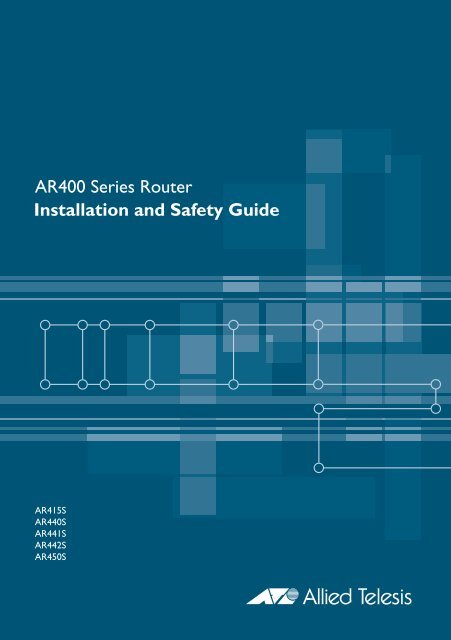
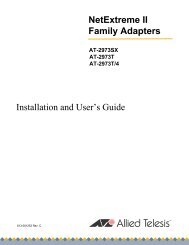
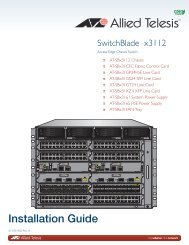
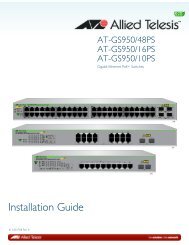
![AT-8100L/8POE-E [Rev B] - Allied Telesis](https://img.yumpu.com/25714603/1/190x245/at-8100l-8poe-e-rev-b-allied-telesis.jpg?quality=85)
